

2024
Münster (FB-12) | 12-12-2024
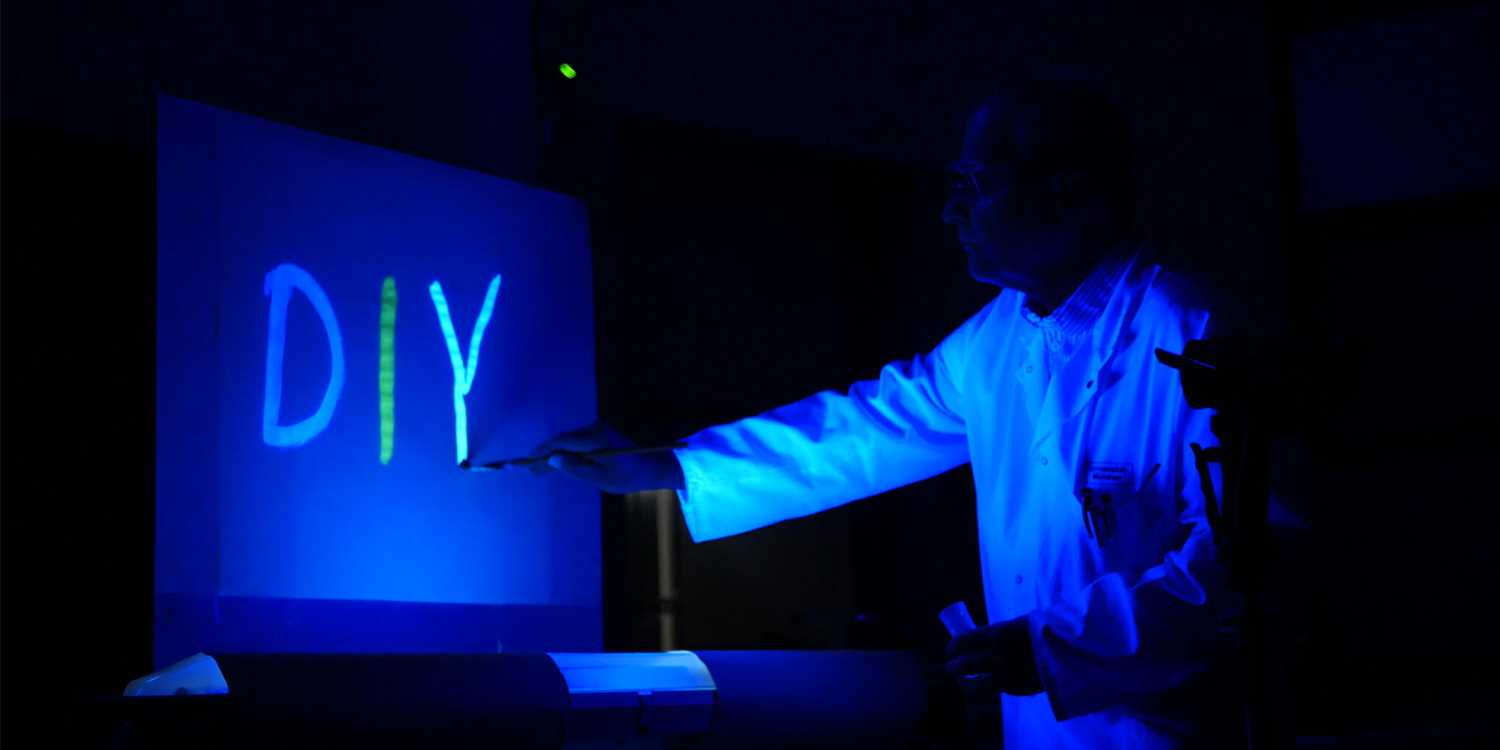
Uni MS – Michael Spitzer Christmas Lecture 2024: Do It Yourself for Chemists
Under the theme ‘Do It Yourself for Chemists’, Prof. Dr. Gustavo Fernandez and Sebastian Baumert prepared the last-minute Christmas celebrations with an audience of around 500 at the Christmas lecture of the Department of Chemistry and Pharmacy . With humour and spectacular experiments, the chemists from the OC Institute proved that chemistry has a solution for everything.
Münster (upm) | 03-12-2024
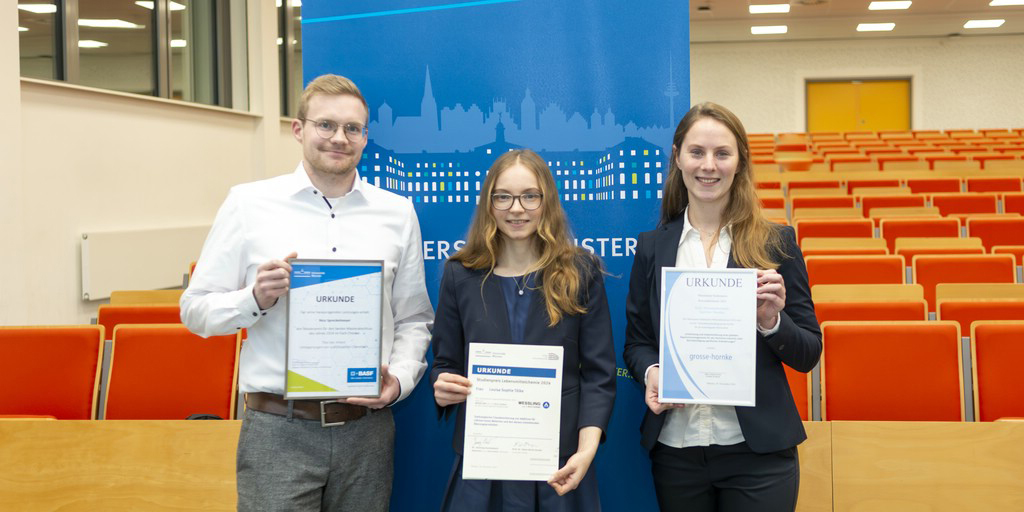
Uni MS - Peter Dziemba Master's theses in chemistry awarded
The Department of Chemistry and Pharmacy at the University of Münster has awarded three outstanding theses in the Chemistry (Nico Spreckelmeyer), Food Chemistry (Louisa Sophie Tölke) and Business Chemistry (Sandrine Mandau).
Münster (upm) | 26-11-2024
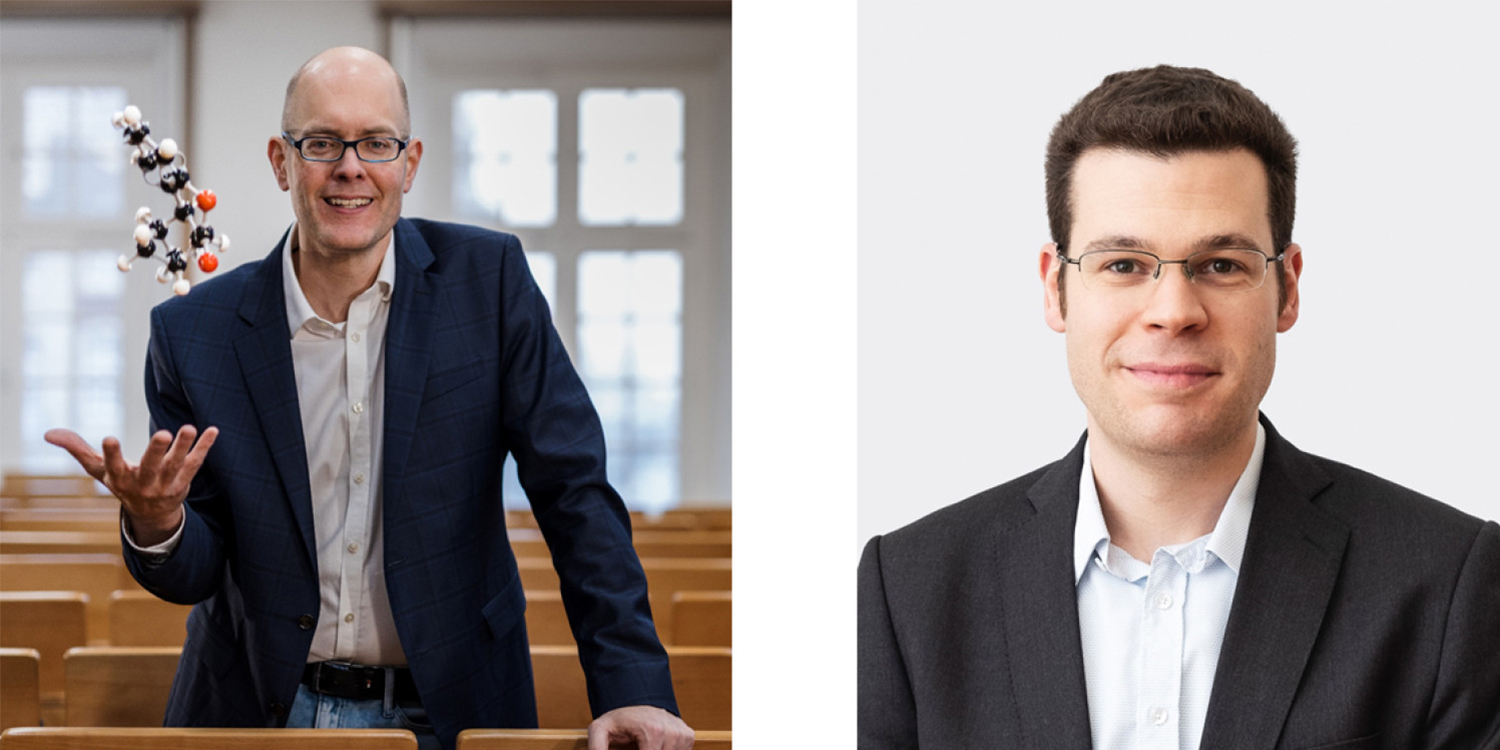
Bayer Foundation/Uni MS - Lukas Walbaum Two chemists from the University of Münster are highly cited
The chemists Prof. Dr. Frank Glorius and Prof. Dr. Wolfgang Zeier are represented in the current citation ranking of the US company "Clarivate Analytics" and are therefore among the highly cited researchers worldwide.
Münster (upm) | 25-11-2024
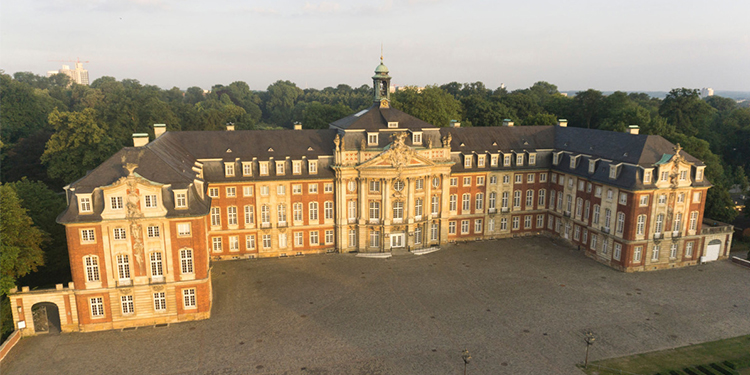
Uni Münster - Jan Lehmann Collaborative Research Centres to receive additional 25 million in funding
The German Research Foundation (DFG) is funding the CRC 1450 “inSight” and the CRC 1459 “Intelligent Matter” with around 25 million euros for another four years.
CRC 1459 "Intelligent Matter"
Münster (upm) | 07-11-2024
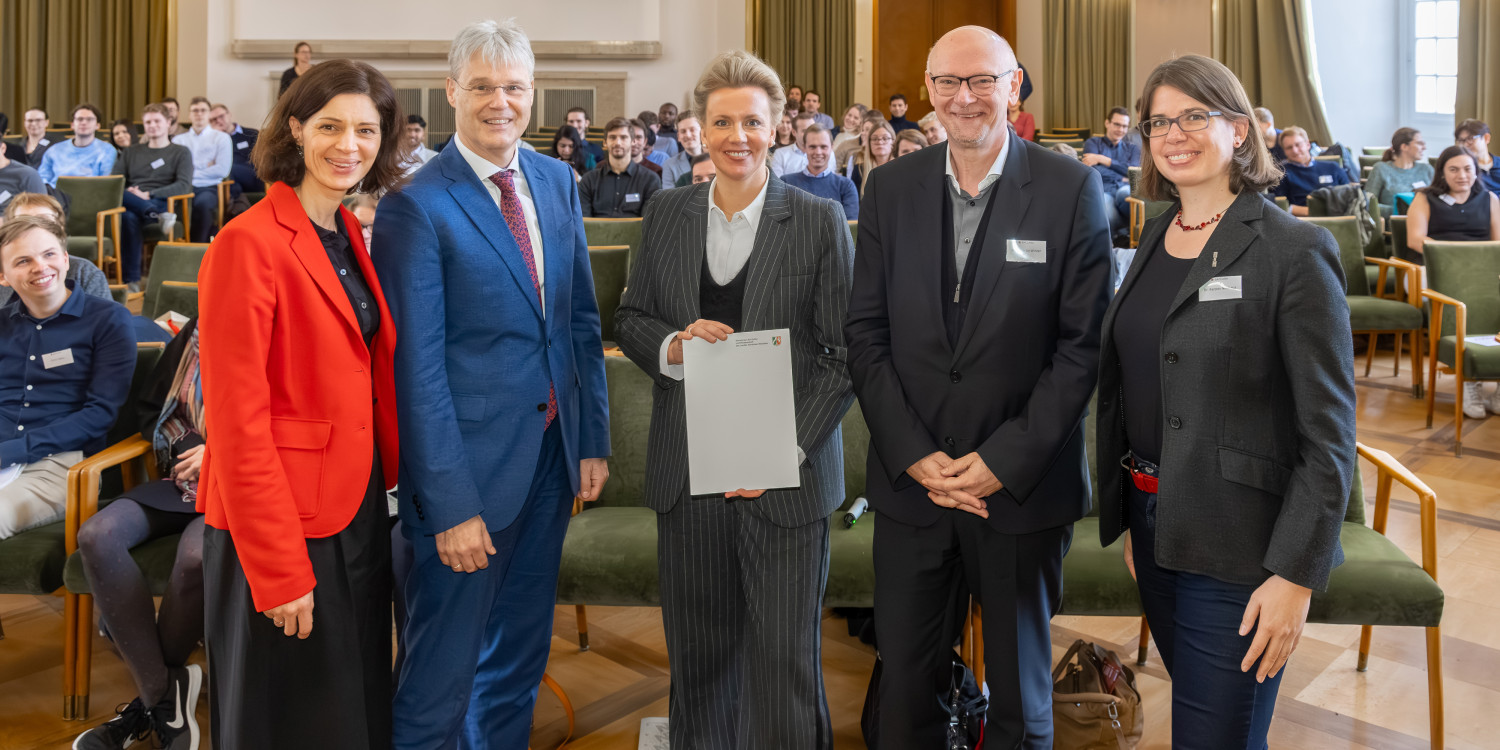
Uni MS - MünsterView Battery research: International Graduate School receives millions in funding
The International Graduate School “BACCARA” is set to receive around five million euros from the Ministry for Culture and Science of the State of North Rhine-Westphalia.
Münster (upm) | 23-10-2024
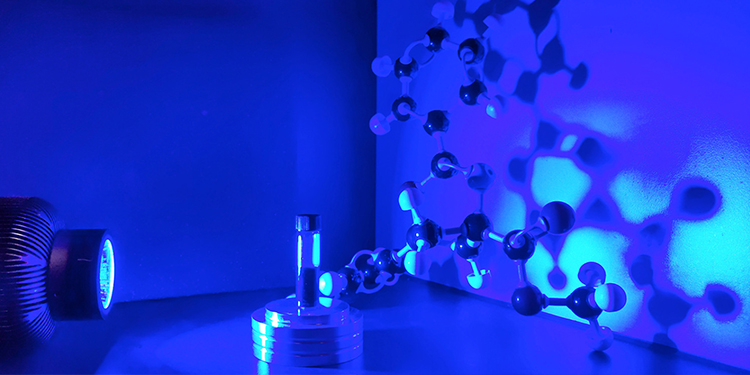
AG Glorius - Dr. Chetan Chintawar (Symbolfoto) New method for producing innovative 3D molecules
A team led by chemist Prof Dr Frank Glorius has synthesised so-called heteroatom-substituted cage-like 3D molecules. The innovative structures could help address key challenges in drug design by serving as more stable alternatives to traditional, flat, aromatic rings.
Münster (upm) | 10-09-2024

GDCh/www.photo-buettner.de Frank Glorius receives Emil Fischer Medal
The chemist Prof. Dr. Frank Glorius has received the Emil Fischer Medal of the German Chemical Society (GDCh). The GDCh honours his "pioneering contributions to organic synthesis methodology and the design of functional molecules" with the award, which is endowed with 7500 euros.
Münster (ocpm) |01-08-2024
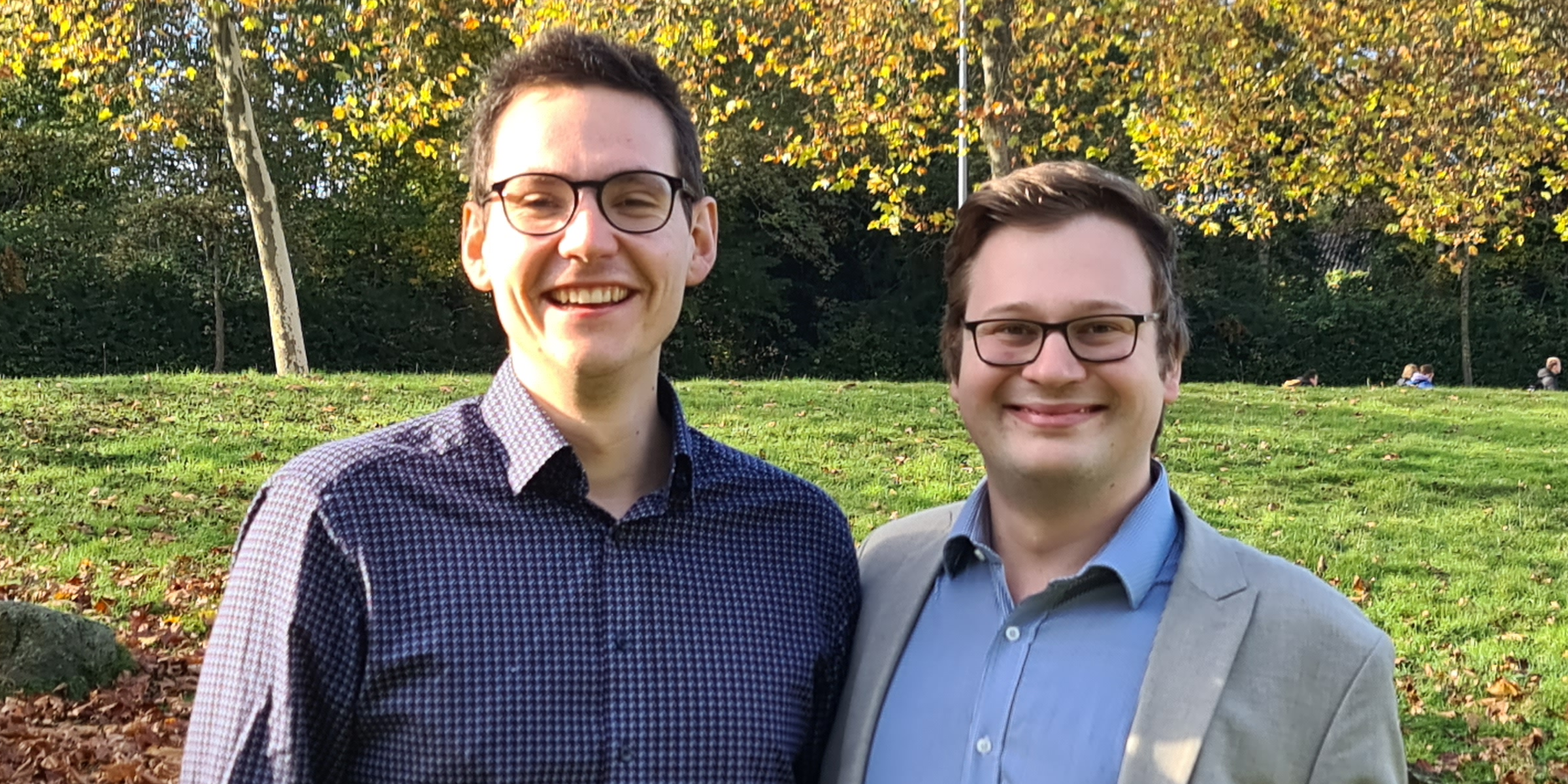
Guido Blanque Organic Chemistry Münster welcomes two new junior research groups
The Organic Chemistry Institute is pleased to welcome two new junior research groups, Dr Robert Hein and Dr Johannes Tölle. Together with Dr Line Muradi (née Næsborg), three junior research groups are currently conducting research at the institute.
Münster (upm/ch) | 15-07-2024
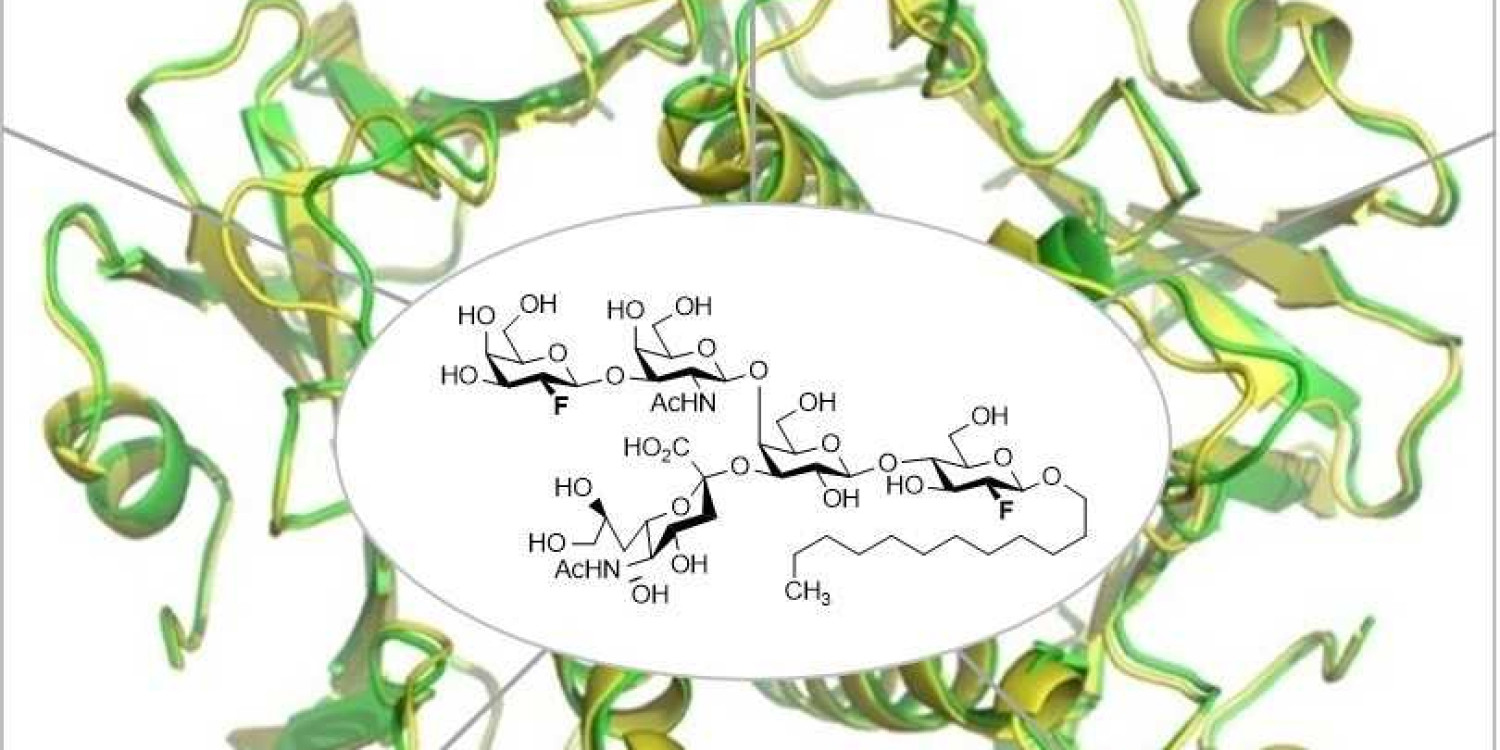
Gilmour Lab/Köhnke Lab New insights into molecular mechanisms of cholera infection
A team from the University of Münster, ETH Zürich and Leibniz-Universität Hannover has investigated a key component of the so-called GM1 cholera toxin complex for the first time using a fluorinated GM1 analogue. The findings on the molecular mechanisms of the strong interaction may help to enable the development of inhibitors that prevent life-threatening cholera infections.
Münster (upm/jh) | 04-07-2024
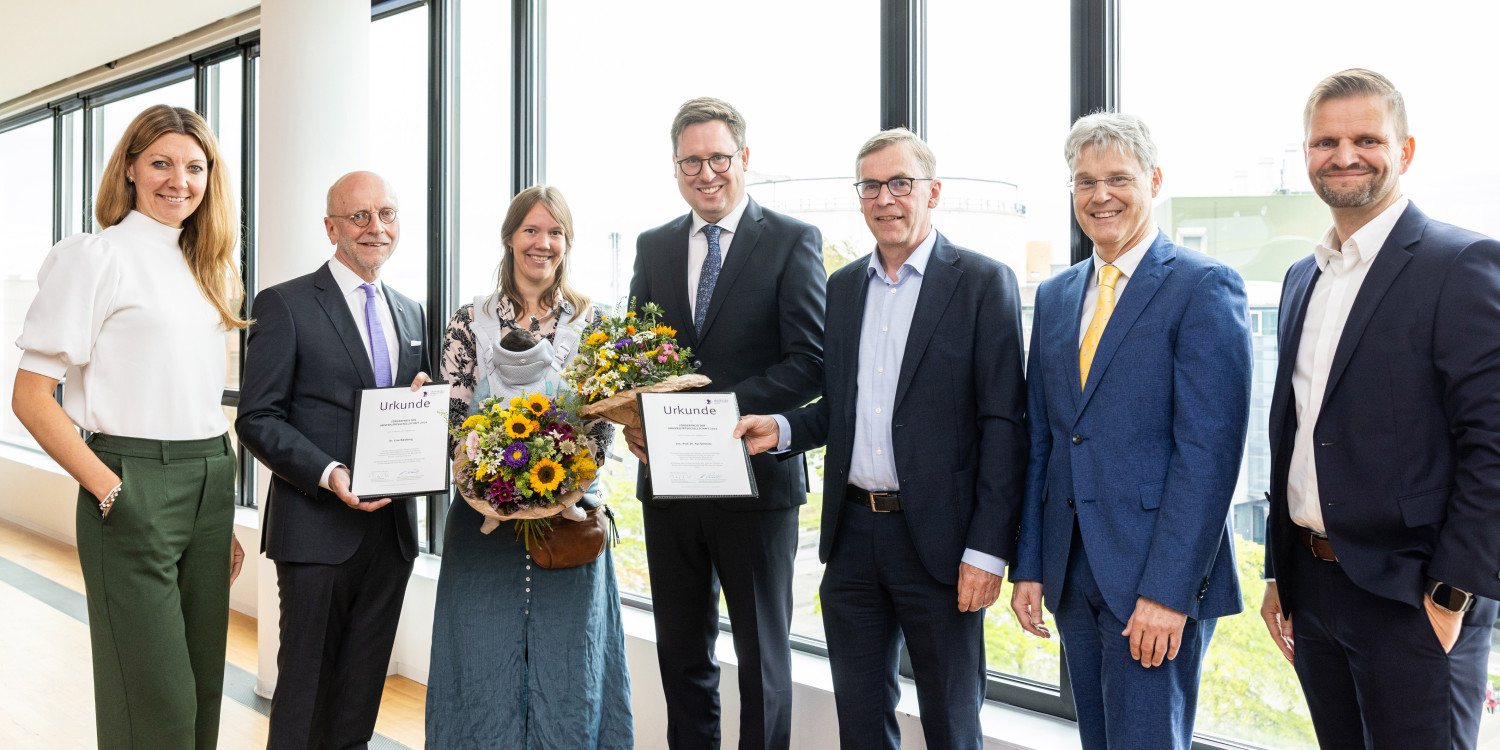
Uni MS - Peter Leßmann Universitätsgesellschaft recognises chemist and physicist
Every year for the past 44 years, the University of Münster Society has honoured young academics at the University of Münster for their excellent research achievements. This year, chemist Dr. Line Næsborg and physicist Prof. Dr. Kai Schmitz received the 10,000 euro prize in equal shares.
Münster (upm/bhe) | 19-06-2024
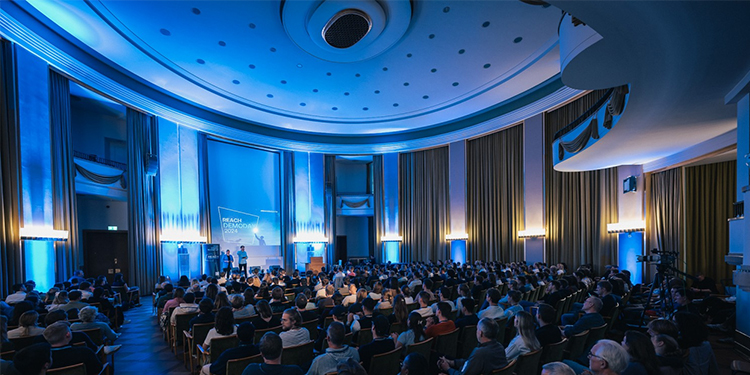
REACH - Thomas Mohn "ChemInnovation" wins start-up competition
The developers of artificial intelligence-based software that automates the complex process of chemical analysis took first place at the "Demoday" of the REACH - EUREGIO Start-up Center at the University of Münster. Six university start-ups took part in the competition in the castle auditorium.
Münster (upm) | 12-06-2024
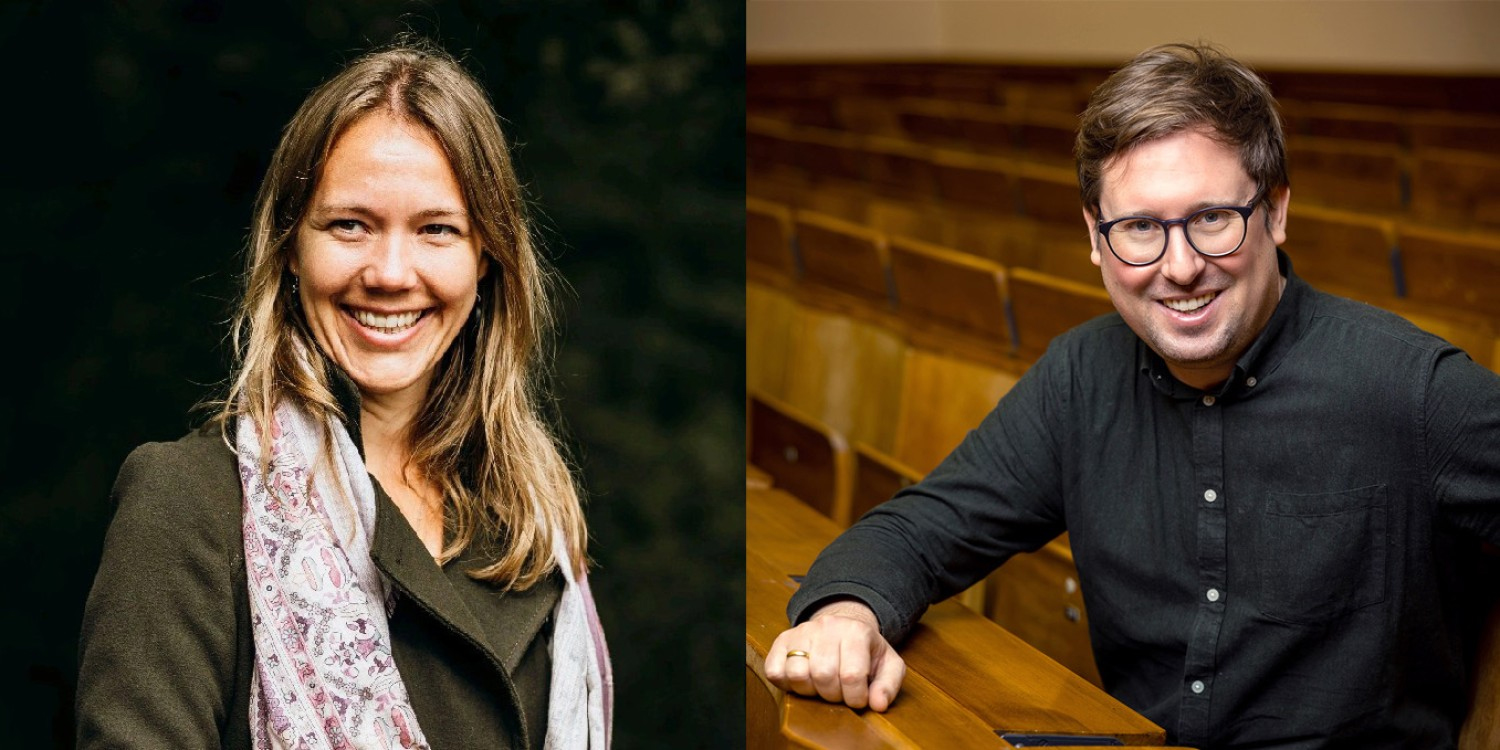
privat / Uni MS - Peter Lessmann Universitätsgesellschaft awards promotion prize - two portraits
The Universitätsgesellschaft Münster e. V. awarded the promotion prize to junior research group leader Dr. Line Næsborg and junior professor Dr. Kai Schmitz on July 3. The chemist Dr. Line Næsborg is researching the sustainable and environmentally friendly use of light energy, while the particle physicist Dr. Kai Schmitz is devoting his work to gravitational waves.
Münster (upm) | 12-06-2024
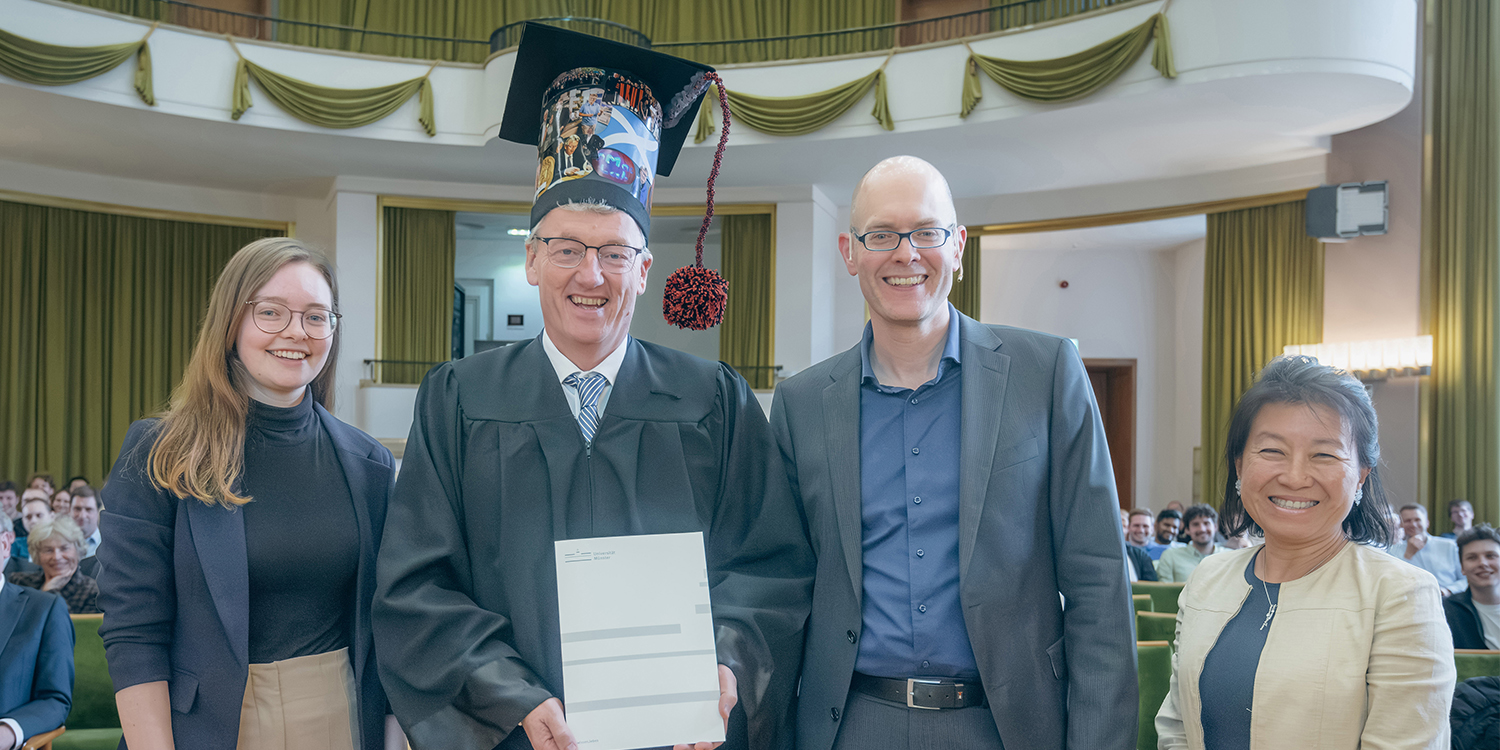
Uni MS - Peter Dziemba Faculty of Chemistry and Pharmacy honours pioneer of photocatalysis
David MacMillan, a professor of Chemistry at Princeton University, is a pioneer of photocatalysis with visible light. The Faculty of Chemistry and Pharmacy has now awarded the 56-year-old Scotsman an honorary doctorate for his outstanding research in this field.
Münster (upm) | 24-05-2024
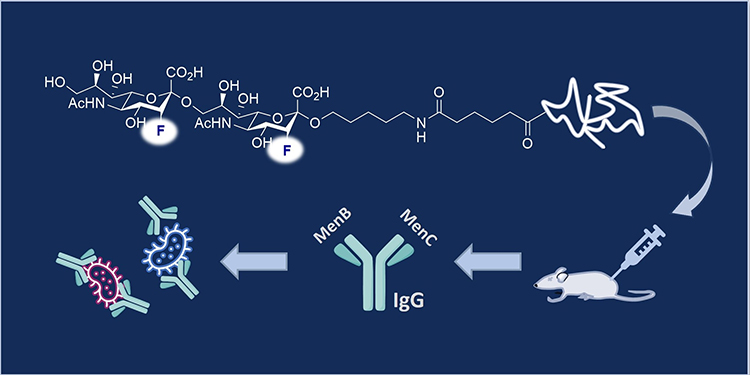
AK Gilmour Fluorinated sugar molecules as vaccine leads against meningitis B and C
A team from the University of Münster and the Max Planck Institute (MPI) of Colloids and Interfaces in Potsdam has now developed a combined vaccine lead from synthetic fluorinated sugar molecules that is effective against meningococci B and C simultaneously.
Münster (upm) | 22-05-2024
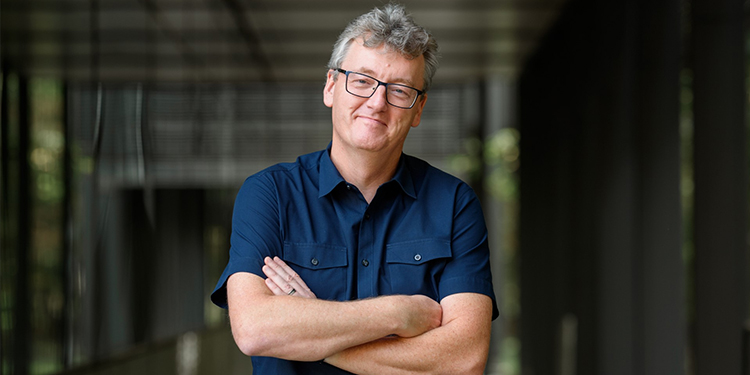
Corinne Strauss Interview with nobel laureate David MacMillan
David MacMillan is one of the most successful researchers of our time in the field of catalysis and molecular chemistry. He is also a pioneer of photocatalysis with visible light. For his outstanding research in this field, he will receive an honorary doctorate from the Faculty of Chemistry and Pharmacy on 11 June. Norbert Robers spoke with the exceptional researcher.
Münster (upm) | 16-05-2024
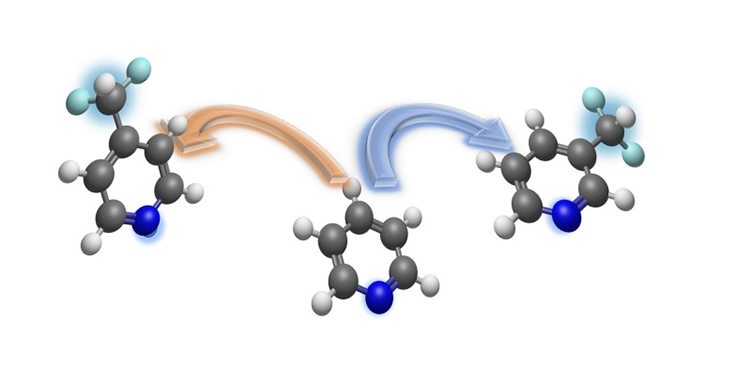
Uni MS - AG Studer New method for introducing fluorinated components into molecules
Researchers led by Prof Dr Armido Studer from the Institute of Organic Chemistry at the University of Münster presents a new strategy, with which the so-called difluoromethyl group can be precisely introduced at specific sites in pyridine derivatives. This method could potentially identify candidates for new drugs and agrochemicals.
Münster (upm) | 10-05-2024
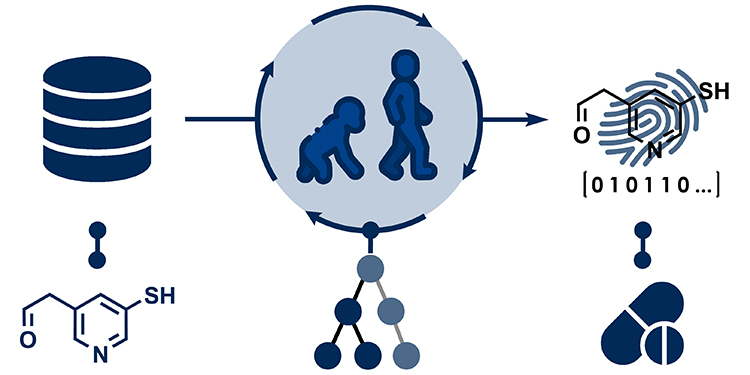
Felix Katzenburg, AK Glorius Evolutionary algorithm generates tailored “molecular fingerprints”
A team led by chemist Prof Frank Glorius has developed an algorithm that identifies molecular structures that are particularly relevant to a given problem. It uses these structures to encode the properties of molecules for various machine-learning models.
Münster (upm) | 11-04-2024
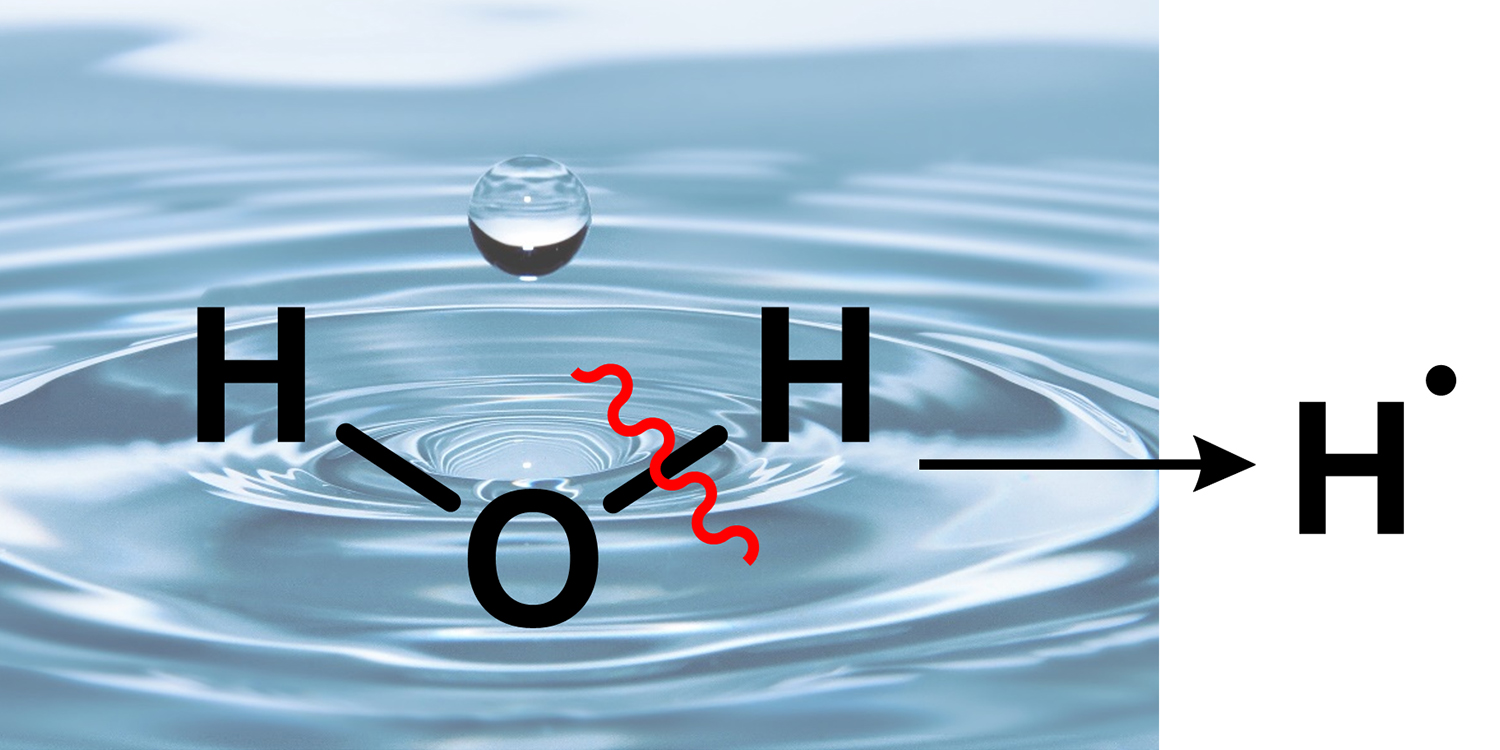
Adaptiert von pixabay.com-ronymichaud European Research Council awards Armido Studer an Advanced Grant
The European Research Council has awarded an ERC Advanced Grant worth 2.5 million euros to Prof. Armido Studer. The grant will enable Studer to realise a project in the field of so-called radical water activation in the coming five years.
Münster (upm) | 10-04-2024
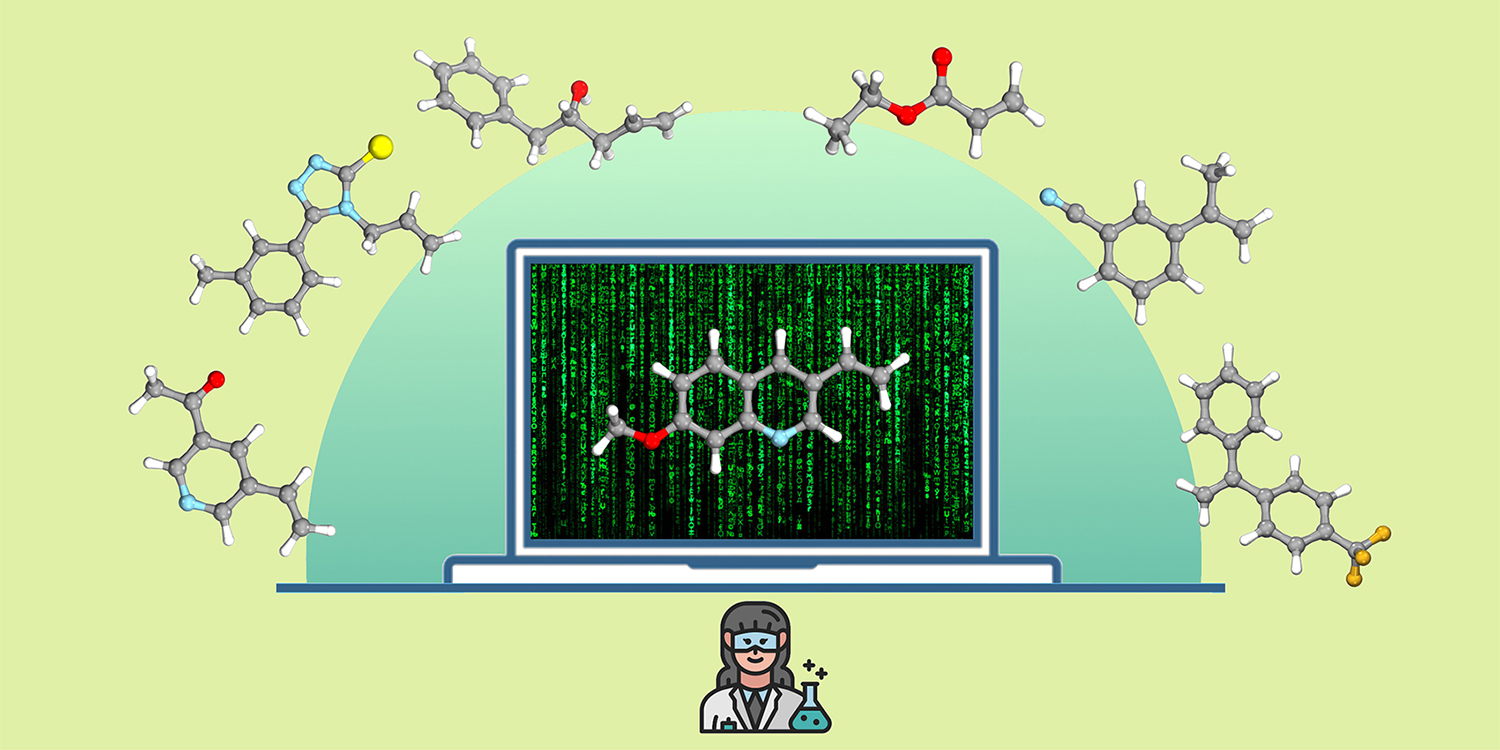
Uni MS – Debanjan Rana/ Glorius Group New strategy for assessing the applicability of reactions
A team led by chemist Prof Frank Glorius from the University of Münster shows that a machine-based method prevents widespread “bias” in chemical publications.
Münster (upm) | 18-01-2024
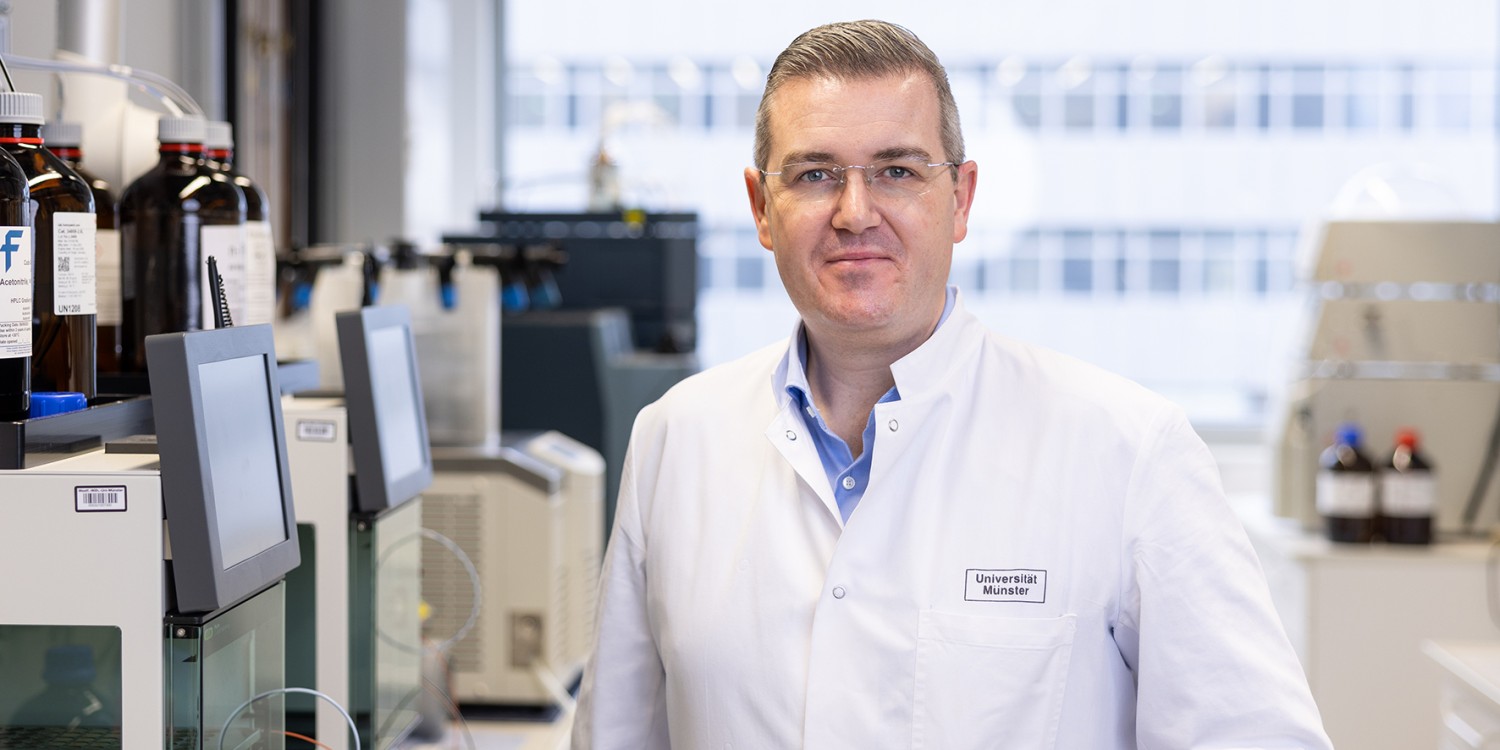
Uni MS - Peter Leßmann Chemist Ryan Gilmour receives "ERC Proof of Concept Grant"
Organic chemist Ryan Gilmour has received a 150,000 euro ERC Proof of Concept Grant. He is now exploring how a strategy to create fluorinated building blocks can be brought to the market.
Münster (upm) | 18-01-2024
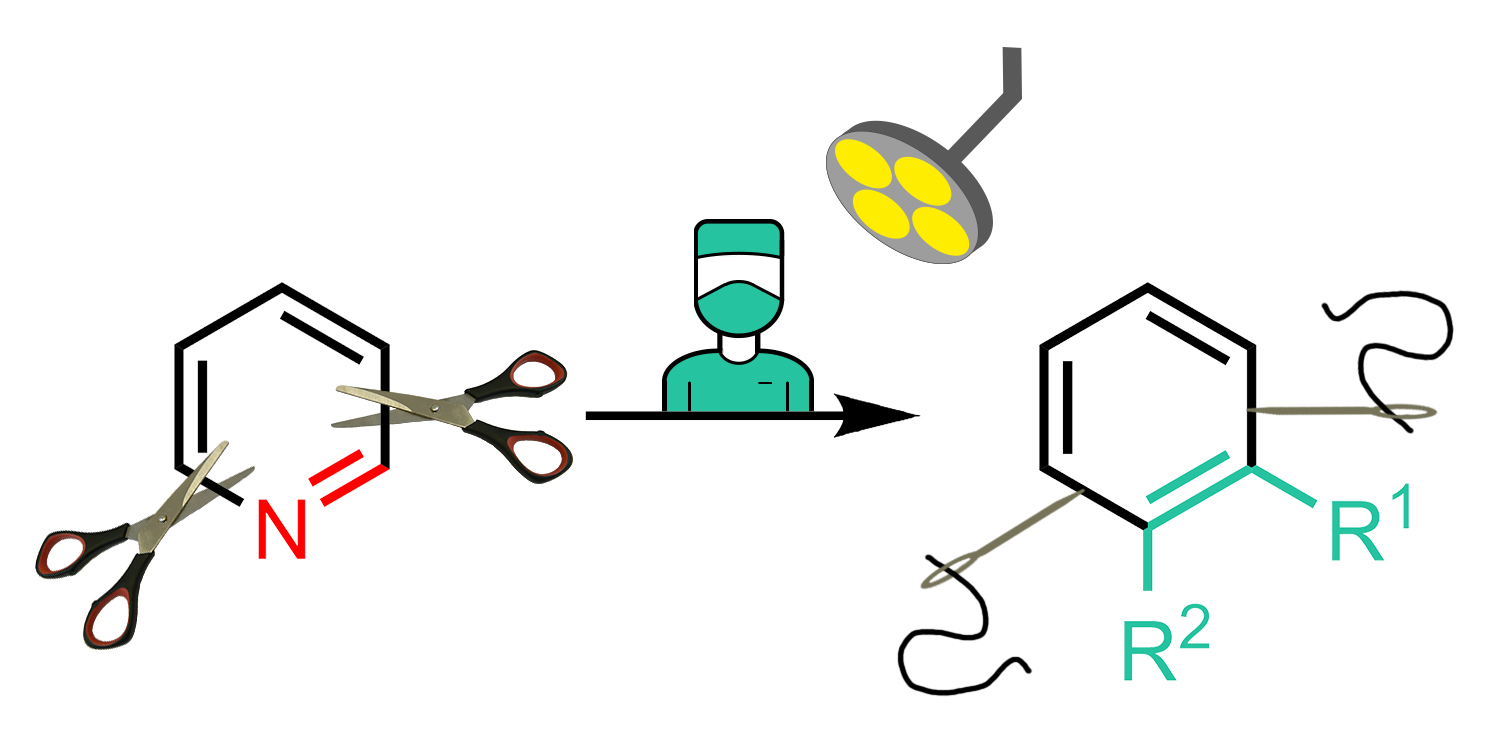
Uni MS – AK Studer Chemical synthesis: new strategy for skeletal editing on pyridines
A team led by Prof. Armido Studer has introduced a strategy for converting carbon-nitrogen atom pairs in a frequently used ring-shaped compound into carbon-carbon atom pairs. The method has potential in the quest for active ingredients for new drugs, for example.
Münster (upm) | 17-01-2024
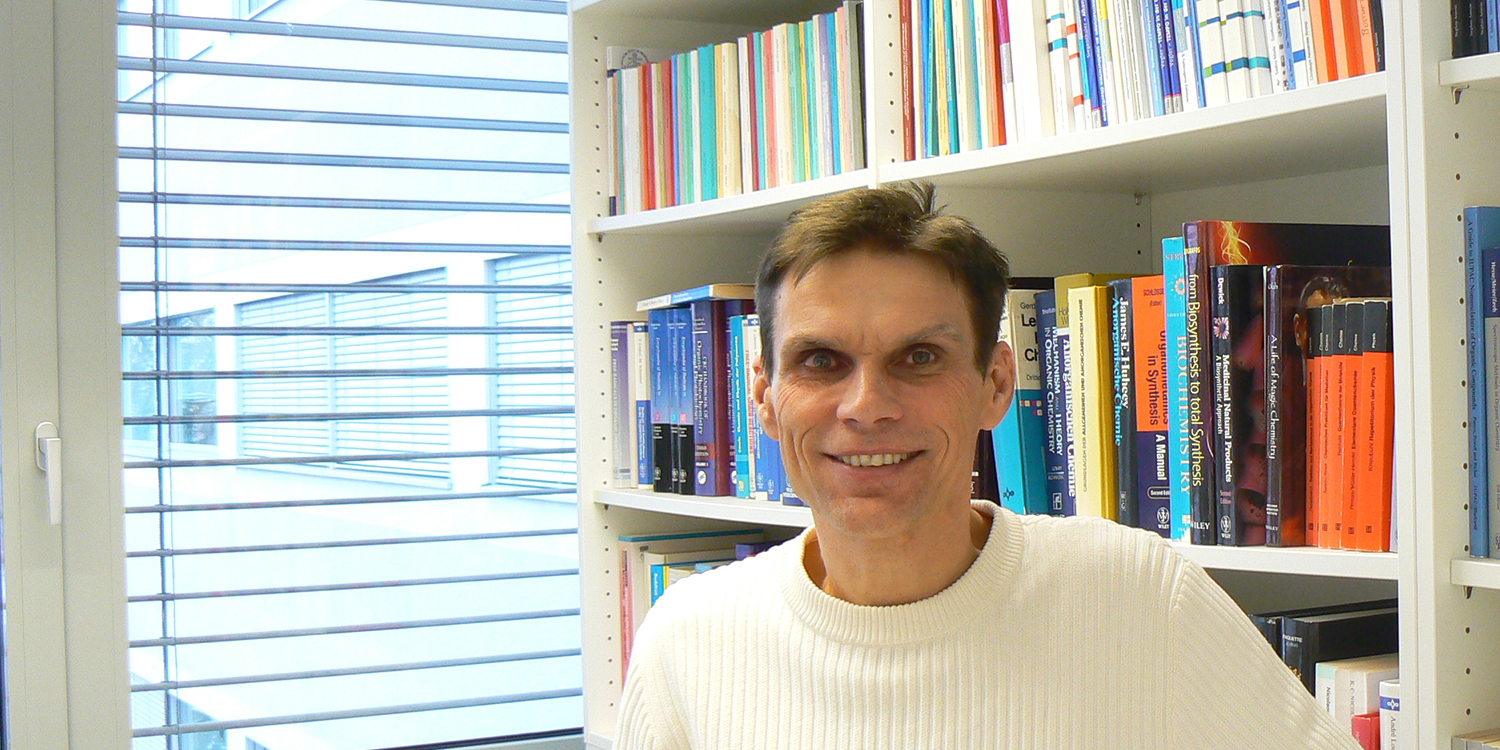
Uni MS – AK Studer "European Academy of Sciences" admits Armido Studer
The European Academy of Sciences (EurASc) has accepted the chemist Prof. Dr. Armido Studer as a new member in recognition of his outstanding achievements in the field of organic synthesis.
Münster (upm) | 09-01-2024
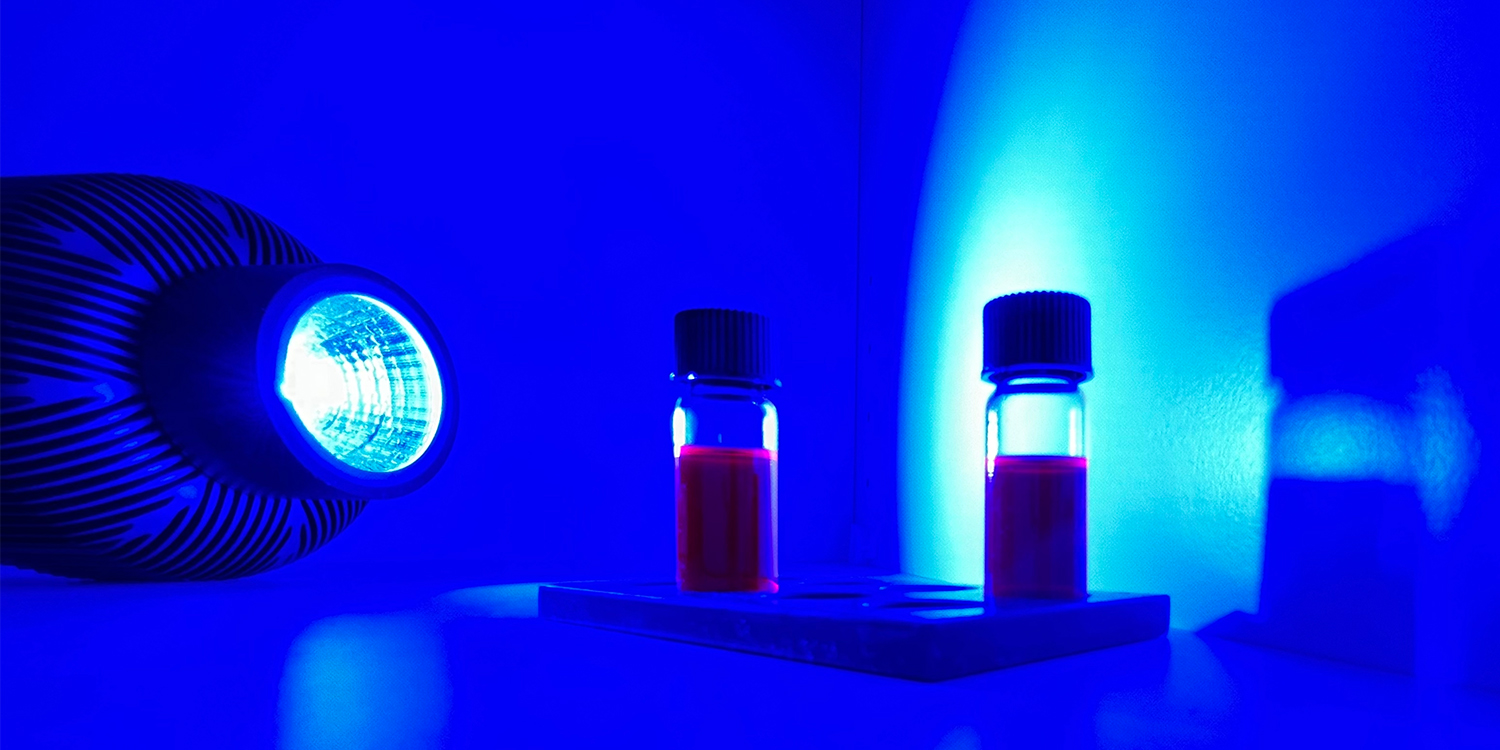
Uni MS - Fu-Peng Wu Chemists develop new approach to inserting single carbon atoms
A team of chemists led by Prof. Frank Glorius have presented a new approach in which a single carbon atom is inserted into the carbon skeleton in order to adjust the ring size and to form a new ring. The method could be relevant, for example, for the production of active ingredients in new pharmaceutical products.
2023
Münster (FB-12) | 02.12.2023
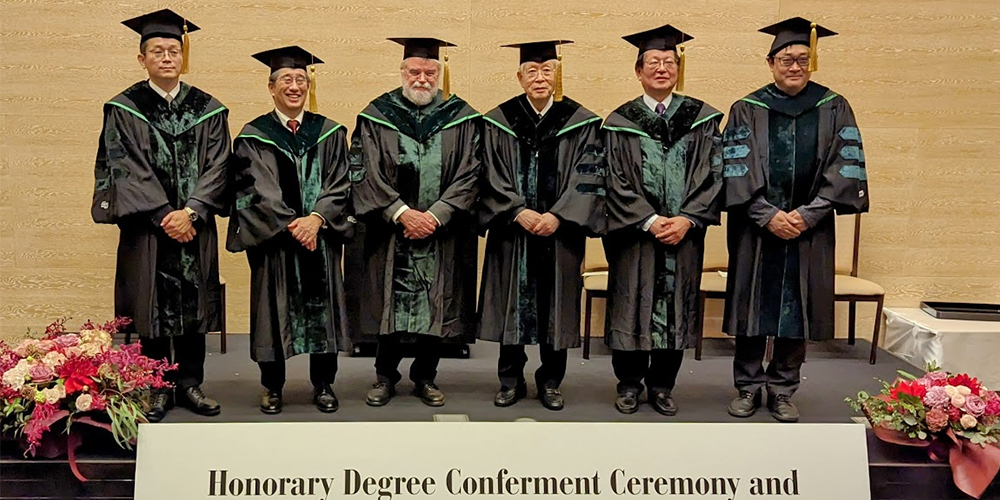
Uni MS – Christian Mück-Lichtenfeld Honorary doctorate for Professor Gerhard Erker
Nagoya University has awarded Gerhard Erker an honorary doctorate. The award recognizes his pioneering research achievements as well as his services to the promotion of international scientific cooperation and academic education. The certificate was presented on December 2nd in Nagoya during one of the regular scientific meetings of the International Research Training Group IRTG 2678.
Münster (upm) | 29.11.2023
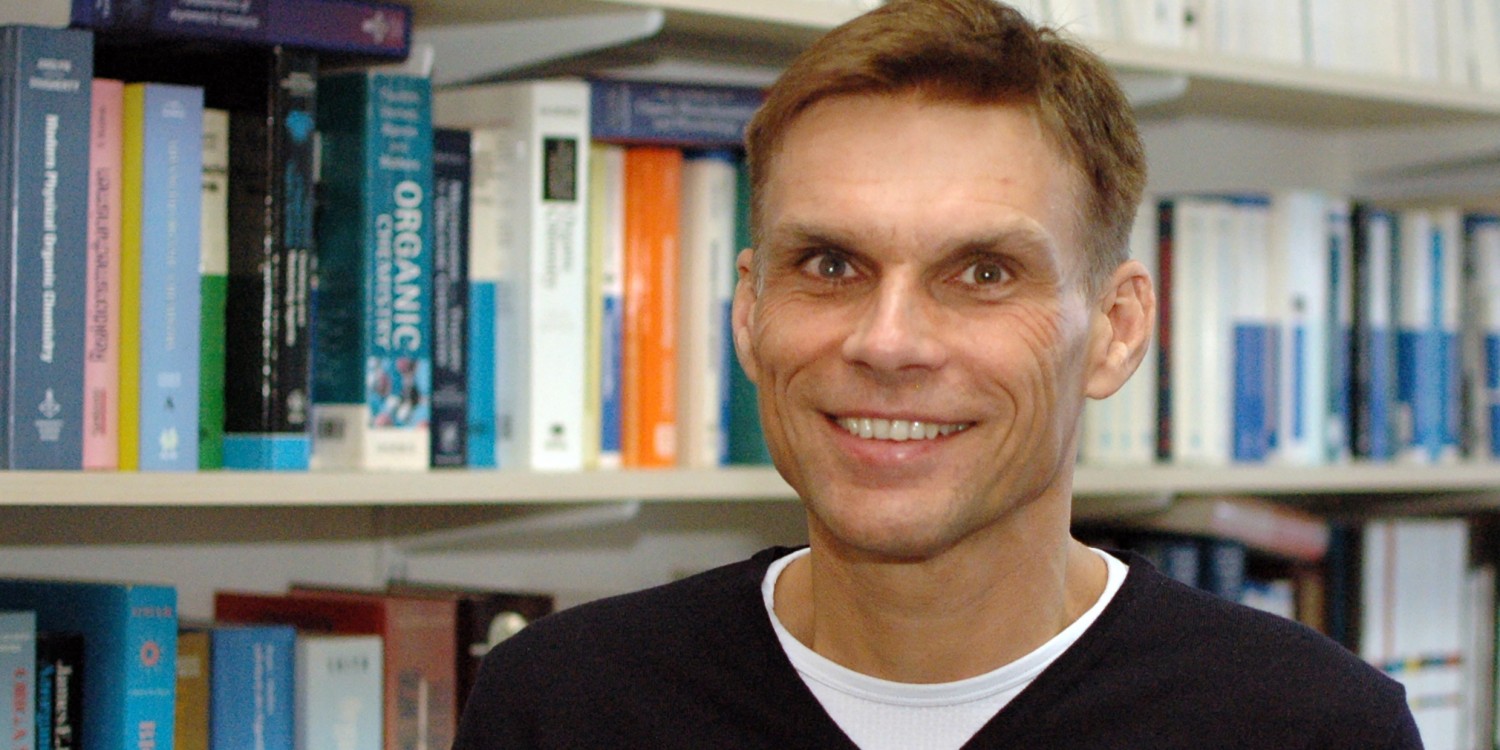
AK Studer Chemist from the University of Münster receives "Paracelsus Prize 2024"
Prof Armido Studer from the Institute of Organic Chemistry at the University of Münster receives the Paracelsus Prize of the Swiss Chemical Society. He is honoured for his work in the field of radical chemistry.
Münster (upm) | 17.11.2023
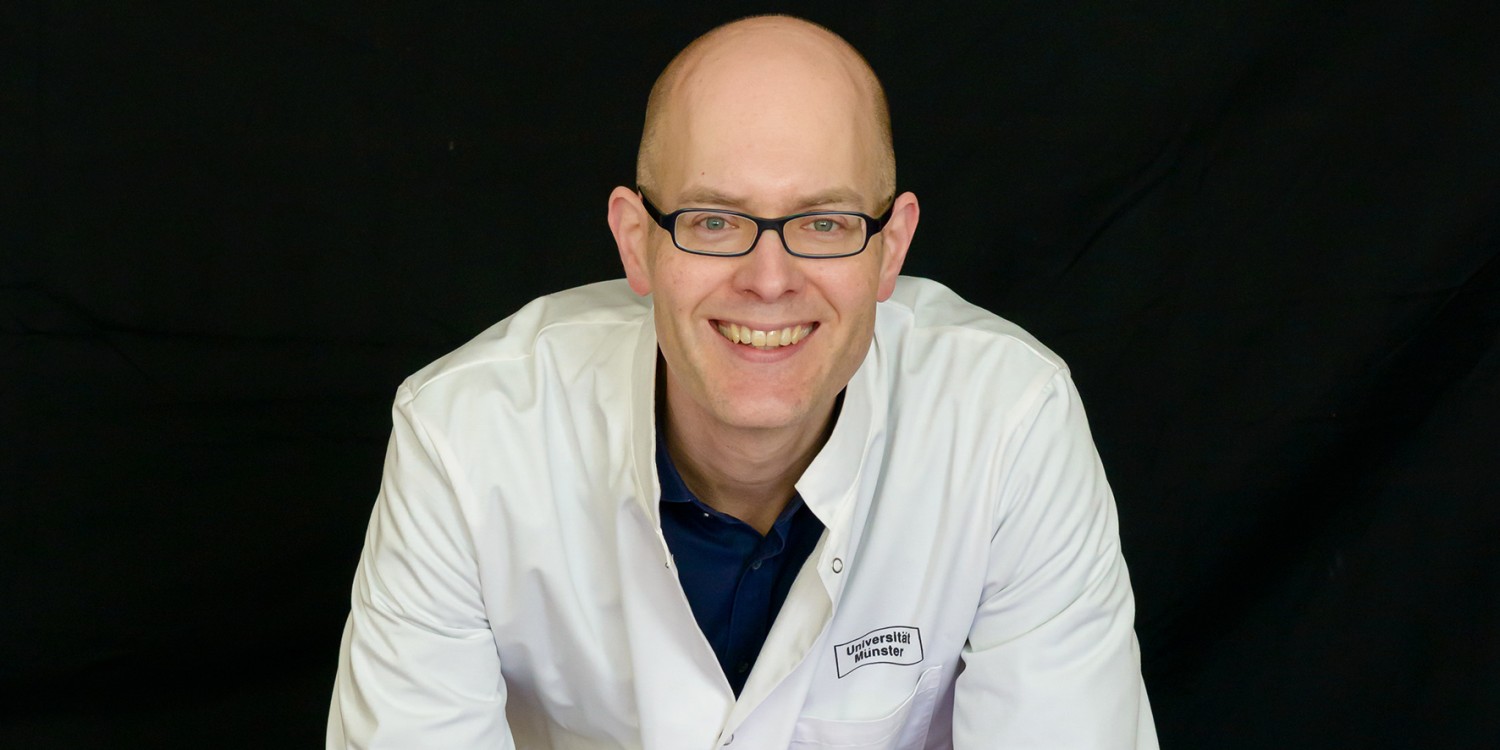
Uni MS - Peter Dziemba Three scientists from the University of Münster are "highly cited"
The chemists Prof. Dr. Frank Glorius and Prof. Dr. Wolfgang Zeier as well as the physician Prof. Dr. Oliver Söhnlein from the University of Münster are represented in the current citation ranking of the US company "Clarivate Analytics" and are thus among the most cited researchers worldwide.
Münster (upm). | 19.10.2023
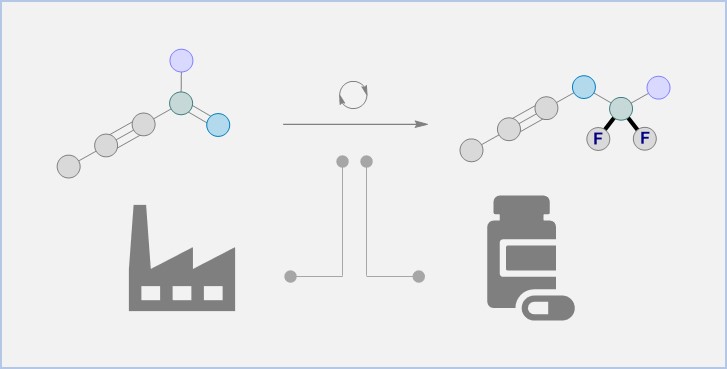
AG Gilmour Chemists present method for the fluorination of enynes
A team led by chemist Prof. Ryan Gilmour shows how a metal-free organocatalytic platform can be used to fluorinate certain carbon compounds. The method creates molecular building blocks that can be candidates for new active substances.
Münster (upm) | 11.09.2023

AK Studer Chemist from the University of Münster receives "Arthur C. Cope Scholar Award"
For his outstanding contribution towards the development of novel radical-based methodologies, Prof. Armido Studer from the Organic Chemistry Institute of the University of Münster receives an "Arthur C. Cope Late Career Scholars Award" worth a total of 45,000 US dollar.
Münster (upm) | 28.08.2023
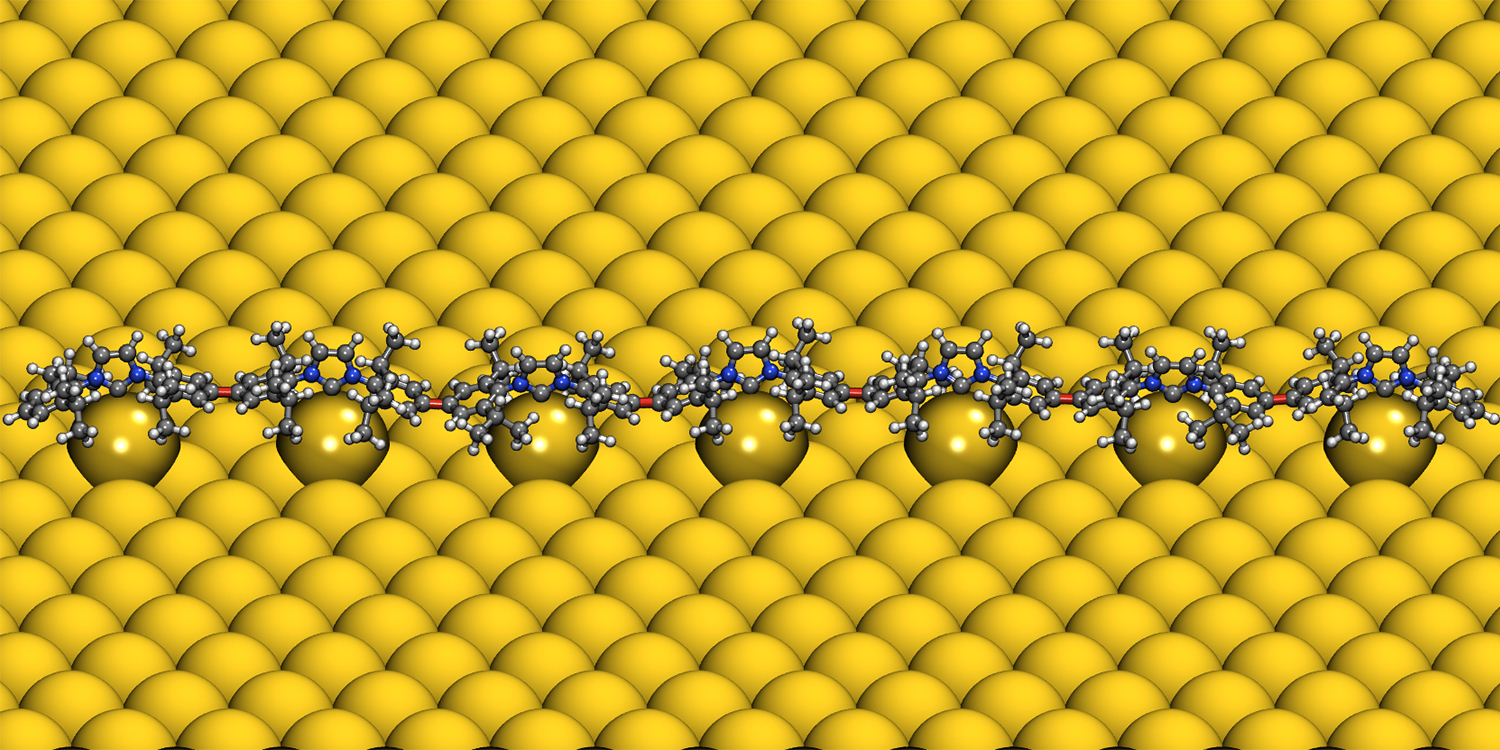
Uni MS – AG Doltsinis Researchers produce polymers from ballbot-type carbenes for the first time
Working together with Chinese researchers, Münster physicists and chemists have, for the first time, produced long-chain mobile polymers on metallic surfaces, doing so by means of ballbot-type molecules which glide over the surface. Details of the work have been published in the journal “Nature Chemistry”.
Münster (upm/kk) | 23.08.2023
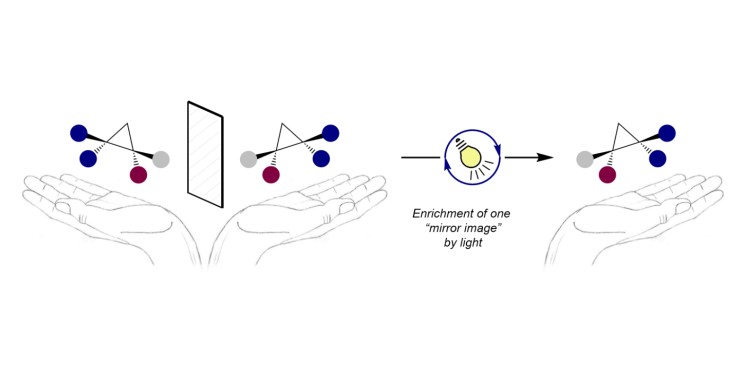
AG Gilmour Light regulates structural conversion of chiral molecules
A team of chemists from the University of Münster developed a novel concept in which a mixture of molecules that behave like mirror images is converted to a single form. To this end, they use light as external energy source. The conversion is relevant e.g. for the preparation of drugs. The study is now published in the journal “Nature”.
Münster (upm/ch) | 22.08.2023

Dylan - stock.adobe.com Together with his research group, chemist Prof. Frank Glorius is organizing a symposium on issues of sustainability in chemistry, which will be held for the first time on August 24th in Münster University's castle.
Münster (upm) | 12.07.2023
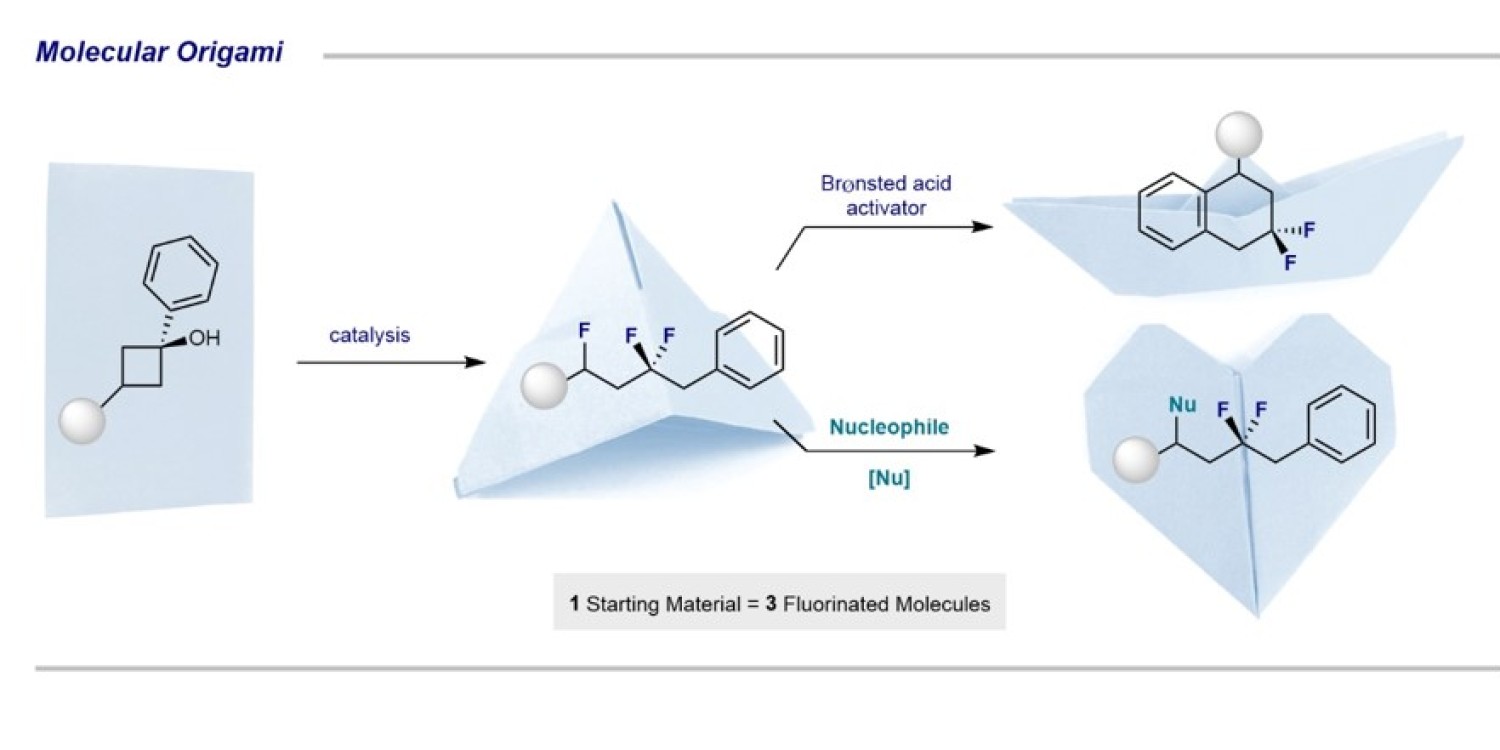
Uni Münster - AG Gilmour Chemists develop reaction cascade to produce fluorinated molecules
A team led by Prof. Ryan Gilmour at the Organic Chemistry Institute has reported in “Nature Communications” on the rapid generation of new fluorinated molecular fragments for drug discovery using organocatalysis.
Münster (upm) | 06.07.2023
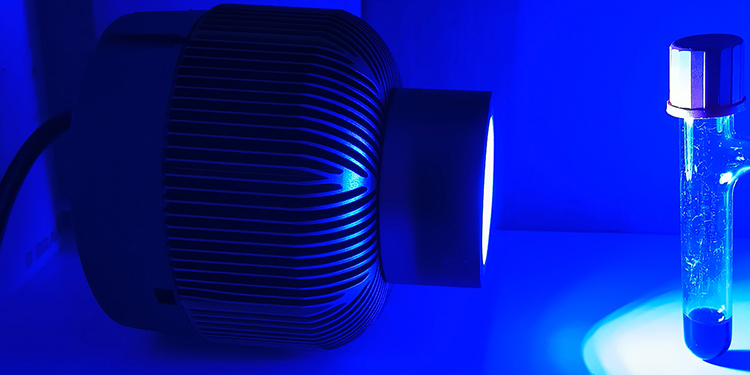
Uni MS – AG Glorius Chemists develop new process for the production of ring-shaped molecules
An international team of chemists led by Professors Frank Glorius (University of Münster) and Kendall N. Houk (University of California, Los Angeles, USA) has succeeded for the first time in using structural editing to insert a four-membered molecular ring into a larger, aromatic ring. This resulted in a structurally complex bicyclic ring system.
Münster (upm) | 06.07.2023

Uni MS - Peter Leßmann European Academy elects Ryan Gilmour of the Institute of Organic Chemistry
The "European Academy of Sciences" (EURASC) has elected Prof. Ryan Gilmour from the Institute of Organic Chemistry at the University of Münster as a "Fellow". Election into the Academy is a great honour and important recognition of his scientific accomplishments.
Münster (upm) | 28.06.2023
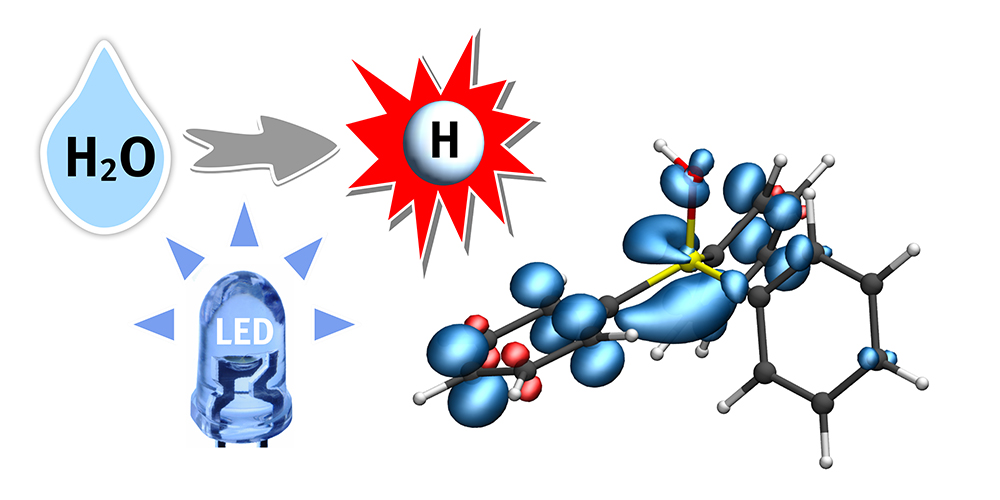
Christian Mück-Lichtenfeld Chemists develop new method for water splitting
A team headed by Münster University chemist Prof. Armido Studer has developed a photocatalytic process in which water is activated using an oxidised triaryl phosphine as a reagent. Activation is a precondition for splitting water into its components.
Münster (upm) | 27.06.2023
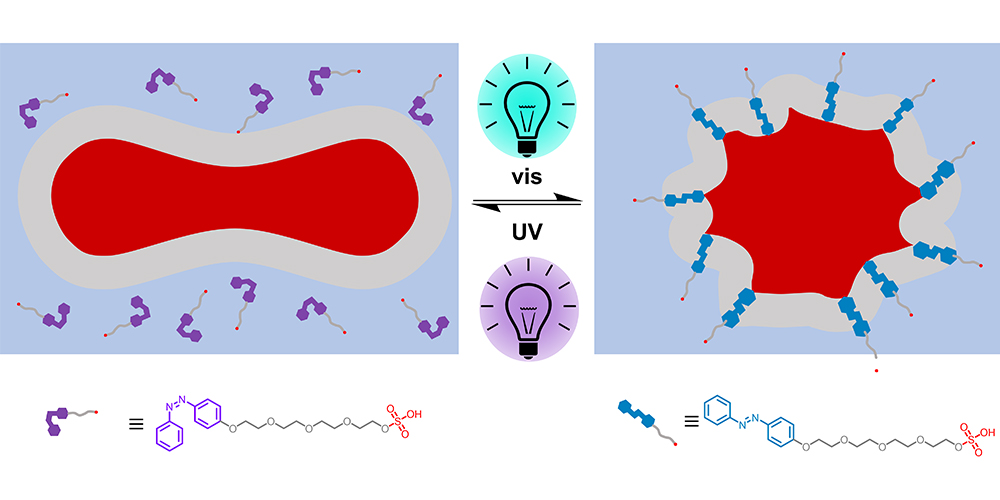
Adaptiert nach Höglsperger F. et al., Nature Communications, DOI: 10.1038/s41467-023-39032-0; lizensiert nach CC BY license Research team shows how a cell’s form can be reversed
A research team led by Prof. Bart Jan Ravoo (University of Münster) and Prof. Timo Betz (University of Göttingen) describes for the first time how living cells can be reversibly deformed by specifically influencing the cell membrane using light.
Münster (upm) | 24.05.2023
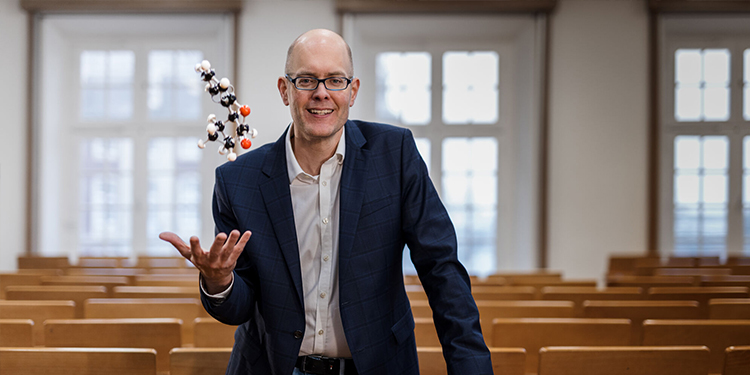
Bayer Foundation Chemists develop new approach in cancer research
An American-German research team describes in the scientific journal "Nature" a new approach to switch off certain "cancer genes" via a targeted modification of RNA. Among the scientists is Prof. Frank Glorius from the Institute of Organic Chemistry at the WWU Münster.
Münster (upm/ch) | 30.03.2023

Bayer Foundation EU Research Council awards Frank Glorius with "ERC Advanced Grant
Award for top research: Chemist Prof. Dr. Frank Glorius from the University of Münster receives one of the prestigious "ERC Advanced Grants" from the European Research Council (ERC). The funding of 2.5 million euros is intended to enable the realization of an outstanding research project.
Organisch-Chemisches Institut | 24.03.2023
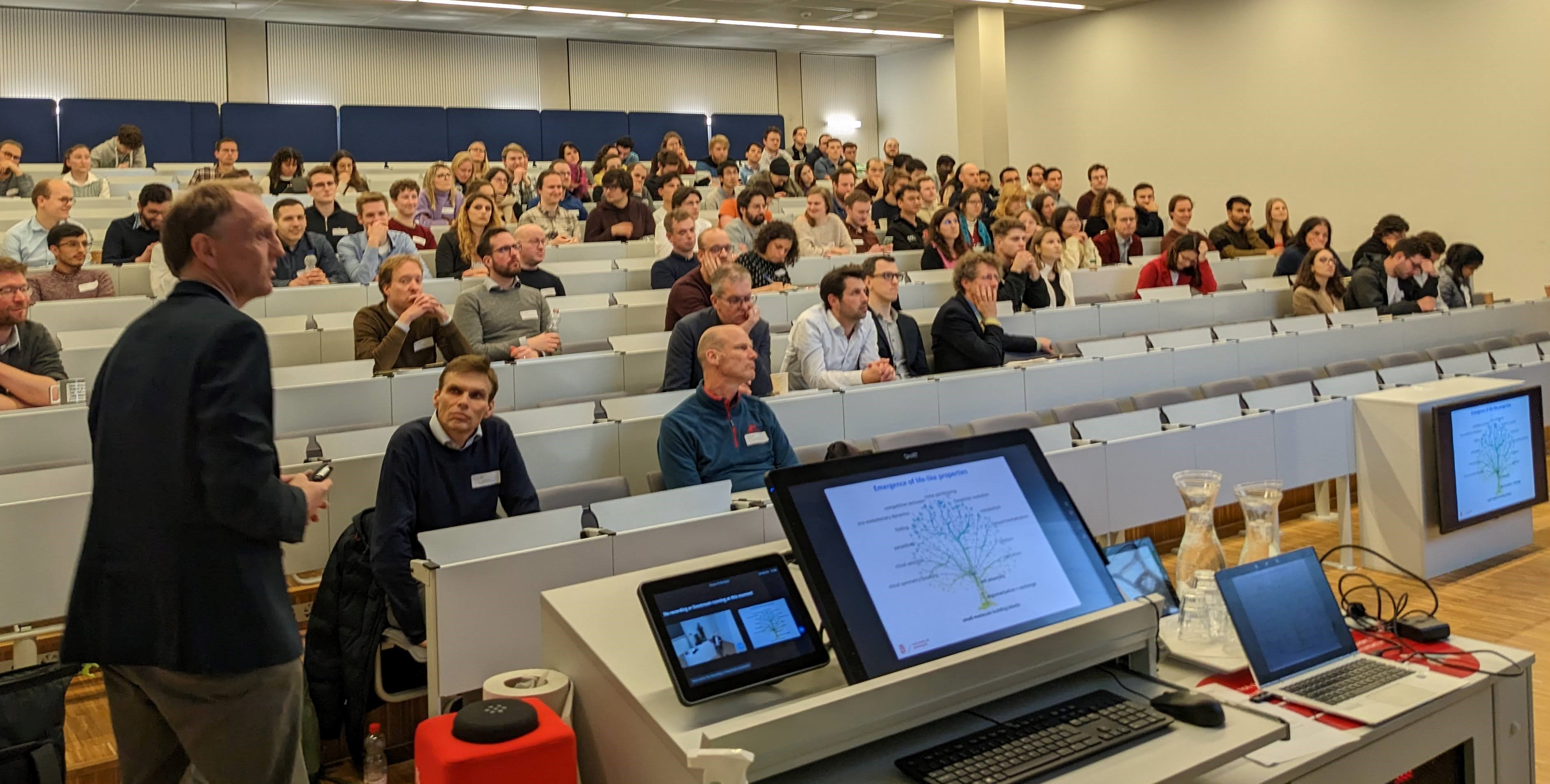
Clemens Mayer The Organic-Chemistry Institute visits Groningen
At a symposium of the Organic Chemistry Institute of the University of Münster with the working groups of the Stratingh-Institut for Chemistry of the Rijksuniversiteit Groningen, their shared features were highlighted, discussed and celebrated through lectures and poster presentations on research topics at the overlap between the two facilities.
Münster (upm/sp) | 25.01.2023

Uni MS - Benjamin Leers Video series: chemist and junior research group leader Line Næsborg
In this series of videos, the Communication and Public Relations department presents six academics from a variety of disciplines who are either junior professors or who head a group of junior researchers.
Münster (upm) | 19.01.2023

Bayer Foundation Frank Glorius receives Otto Bayer Prize
Prof. Dr. Frank Glorius of the Institute of Organic Chemistry at the University of Münster (WWU) has been awarded the Otto Bayer Prize for Chemistry and Biochemistry 2022 by the Bayer Foundation in recognition of his pioneering achievements in catalysis research.
Video Otto Bayer Award
Münster (upm/kk) | 13.01.2023
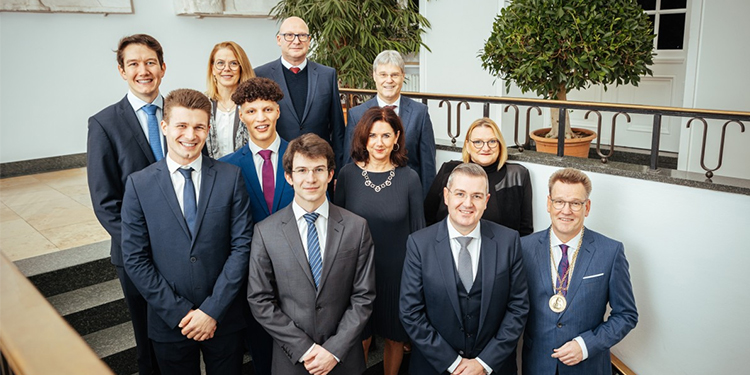
Uni MS - Christoph Steinweg Ryan Gilmour received the Research Prize 2022
On New Year’s Reception in the Schloss Prof. Ryan Gilmour received the Research Prize 2022 for his outstanding, internationally acclaimed research. The prize is awarded every two years and is worth 30,000 euros. In awarding this prize money, the Rectorate supports the recipients’ research.
Video Research Prize2022
Münster (upm) | 08.12.2022
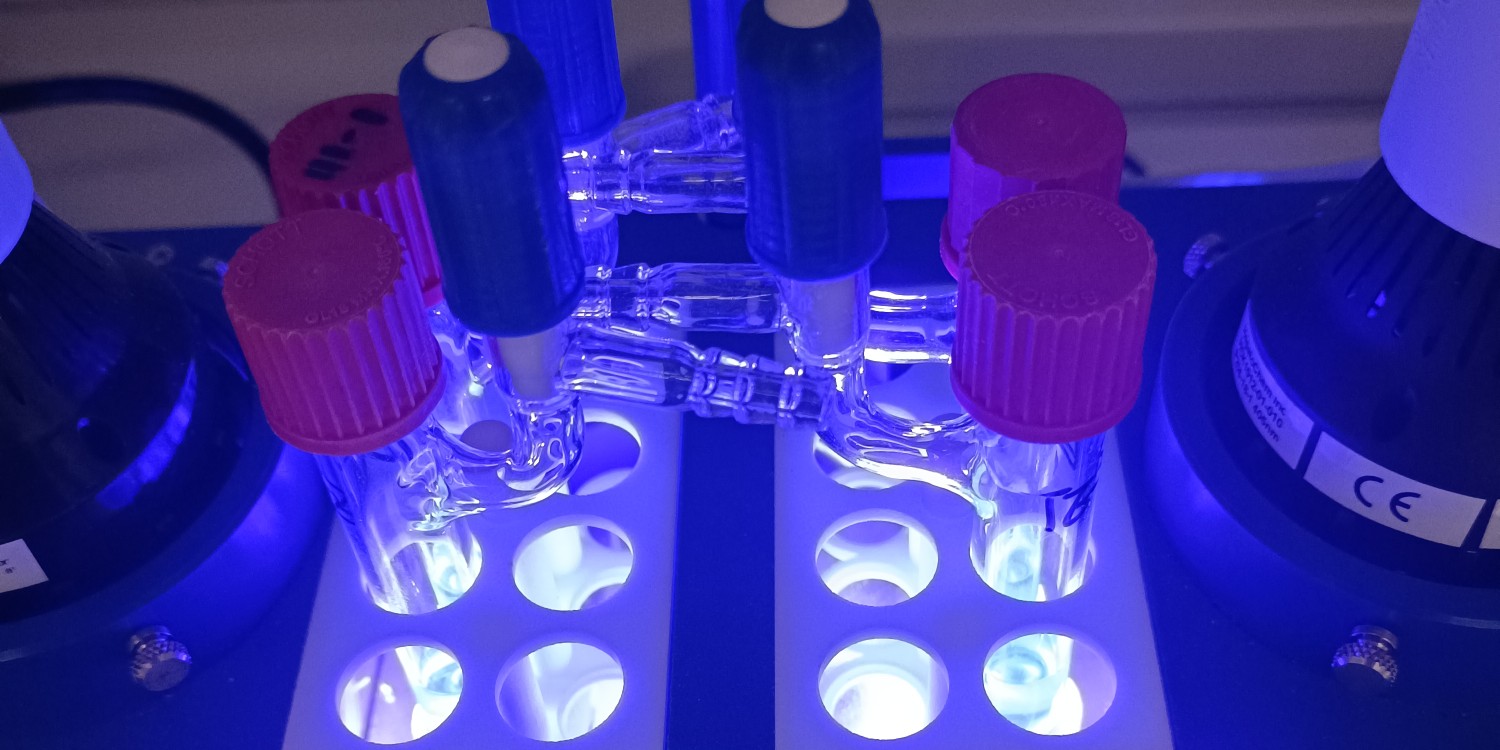
Uni MS - AG Glorius Study shows new way to produce important molecular entity
Chemists at the University of Münster develop method for simple production of vicinal diamines.
A team led by Prof. Dr. Frank Glorius of the Institute of Organic Chemistry at the University of Münster has now presented a new, direct way to produce vicinal diamines in the journal "Nature Catalysis".
Medizinische Fakultät | 08.12.2022
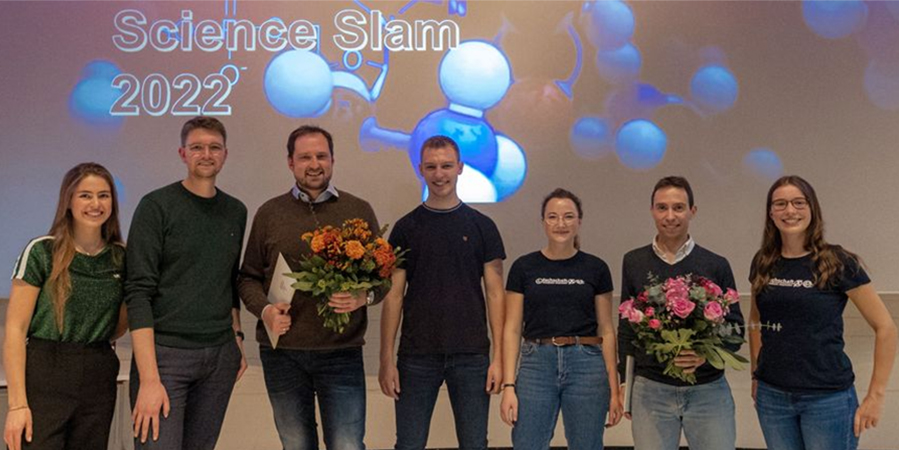
FSMed Münster Gustavo Fernández receives teaching award of the medical student council
The Medical Student Council selected the Teachers of the Year. In the preclinical stage Prof. Gustavo Fernández from the Organic Chemistry Institute was awarded.
He has managed in recent semesters to teach this subject of the first semester in a descriptive, interesting and motivating way.
Fachbereich Chemie und Pharmazie | 25.11.2022
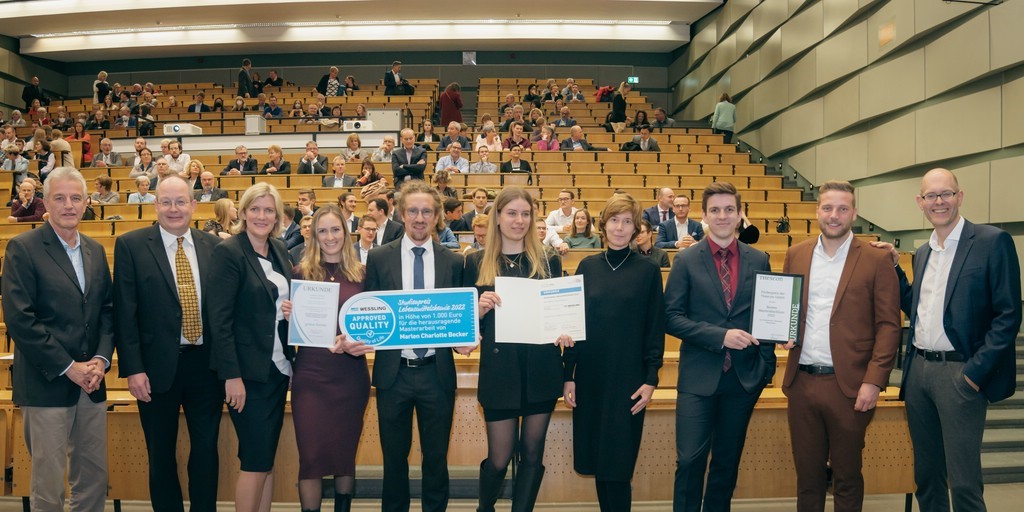
Uni MS - Peter Dziemba Excellent Master's theses in chemistry
The Department of Chemistry and Pharmacy at the University of Münster awarded Fritz Paulus (Organic Chemistry), Laureen J. Dahrendorf (Business Administration in Chemistry) and Marlen C. Becker (Food Chemistry) with the Master’s Theses Prize. The representatives of the sponsoring companies Grosse-Hornke Private Consult, Wessling and Thescon presented the certificates for the awards, which are endowed with 1,000 euros, at the Master's ceremony for the graduation year 2022.
Ryan Gilmour | 24.11.2022
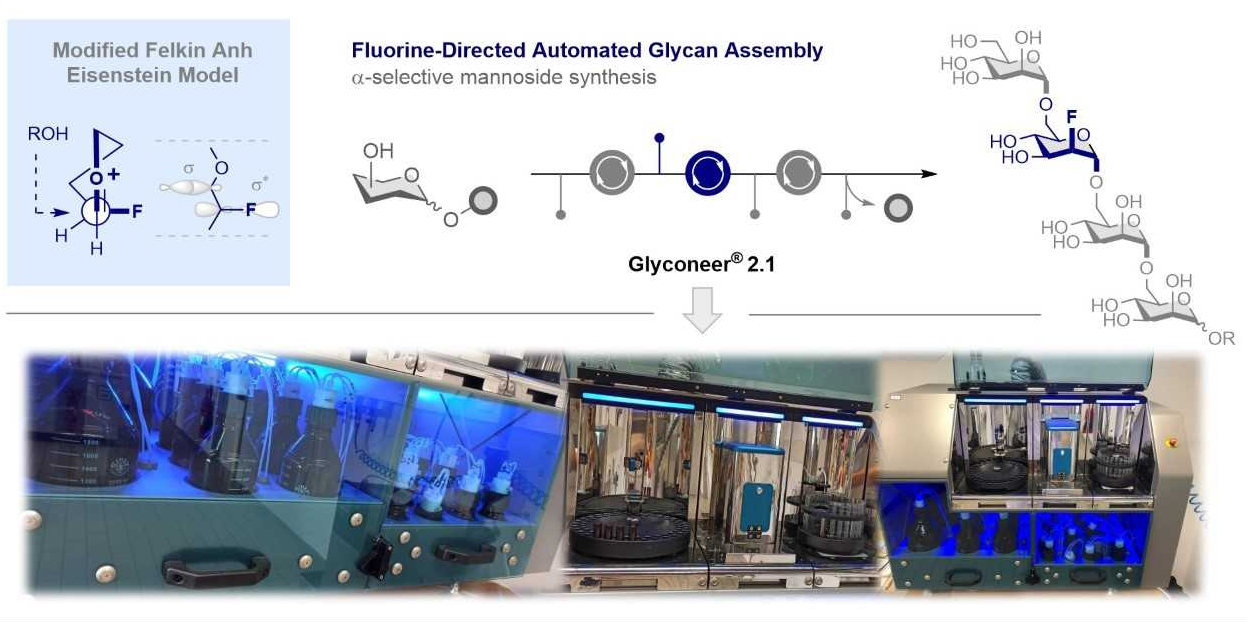
Gilmour Automated Synthesis of Complex, Fluorinated Carbohydrates
Dr. Teschers and Prof. Gilmour of the Organic Chemistry Institute at the WWU Münster have developed an automated method to generate well-defined, site-selectively modified glycomimetics for applications in biomedicine and chemical biology which was published in Angewandte Chemie.
Münster (upm) | 17.11.2022
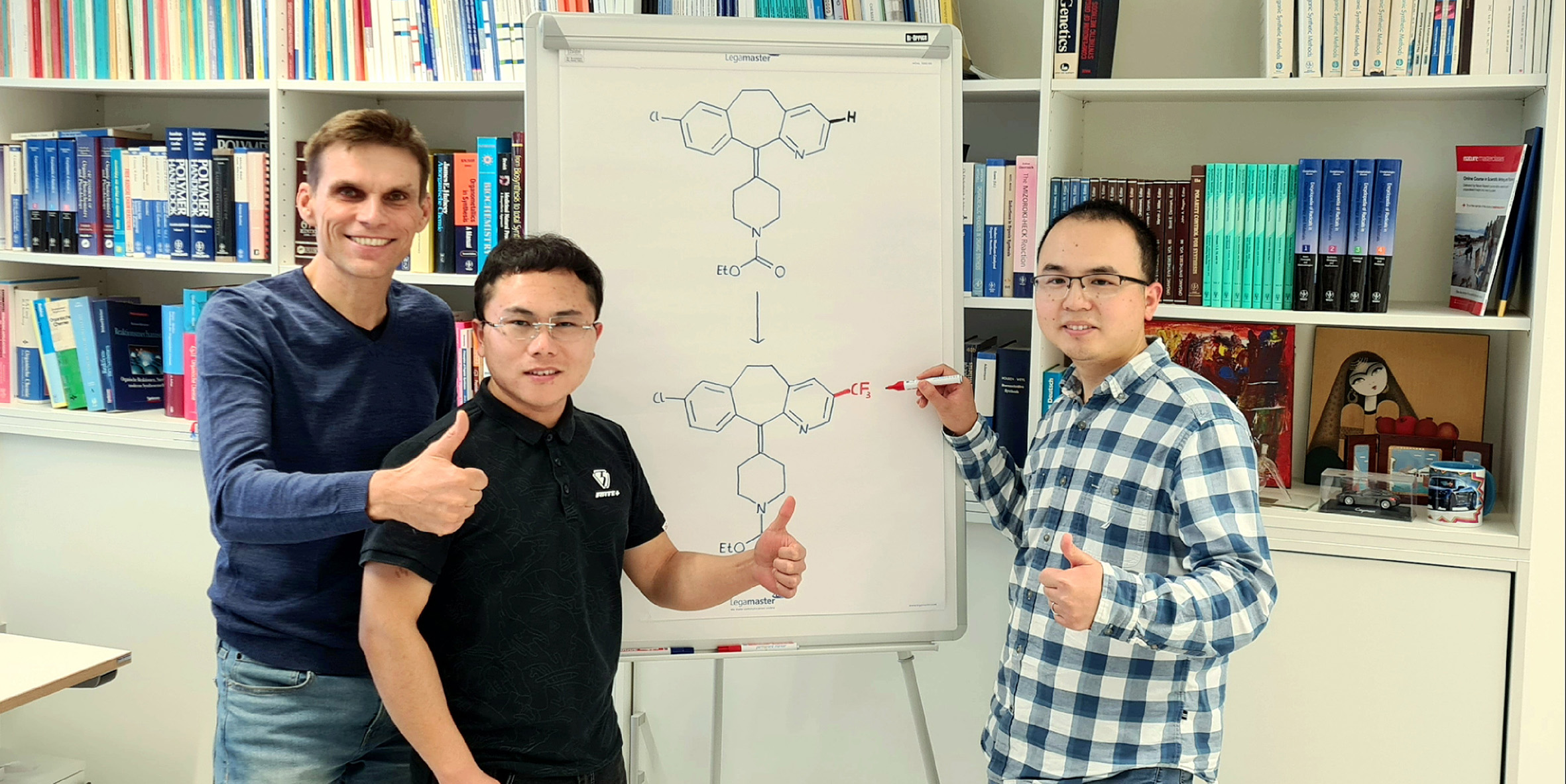
Uni MS - AK Studer Researchers at Münster University solve a problem in organic chemistry
Scientists led by Prof. Armido Studer from the Organic Chemistry Institute at the University of Münster have developed a strategy that could give a boost to the development of pyridine-containing drugs and organic functional materials.
Münster (upm) | 02.08.2022
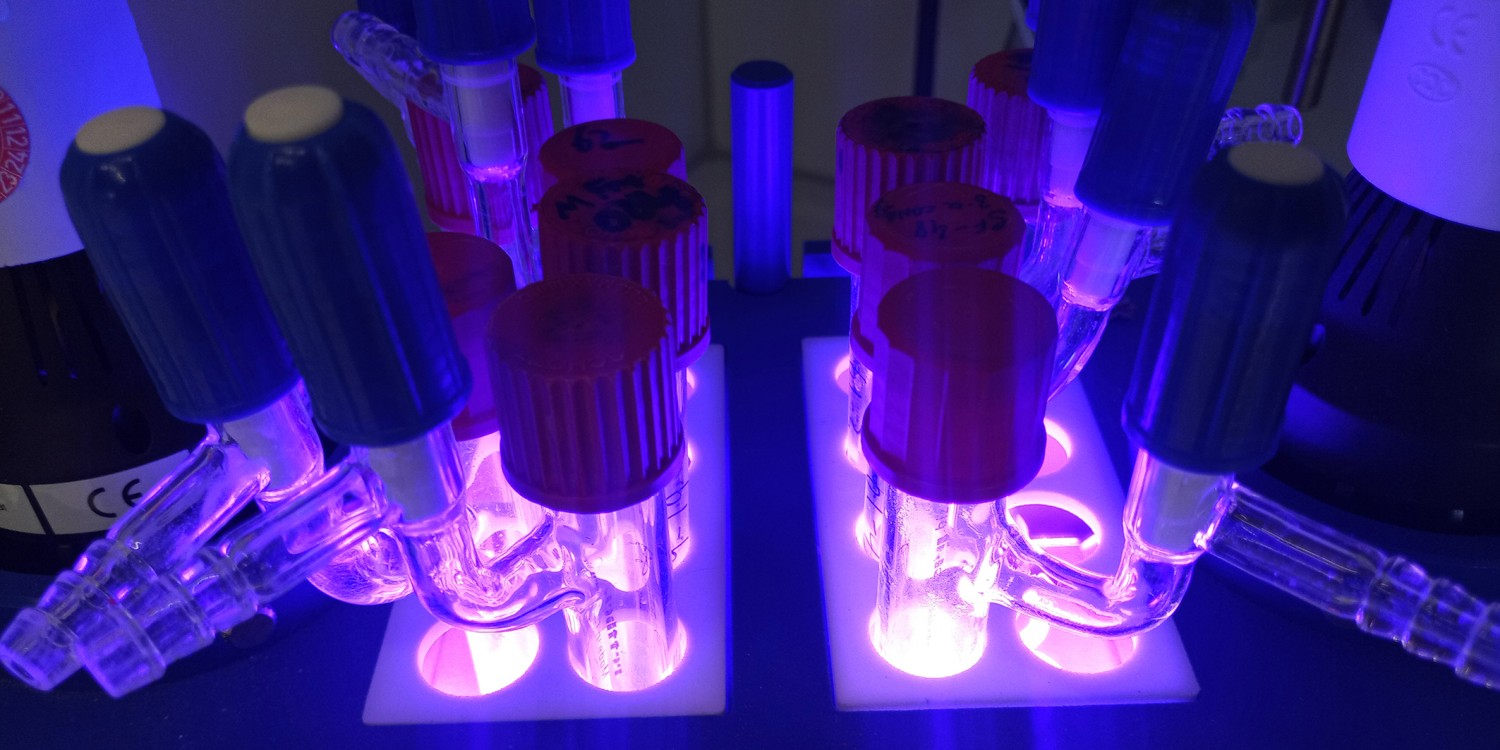
AK Glorius Light as a tool for the synthesis of complex molecules
Chemists at the University of Münster present new method for β-amino acid derivatives from alkenes or (hetero)arenes. The results of the study are currently published in Nature Chemistry.
"Visible light has proven to be a powerful tool for the synthesis of complex organic molecules," explains Prof. Dr. Frank Glorius. "With its energy, we succeed in breaking certain chemical bonds X-Y."
Münster (upm/kn) | 20.07.2022

Uni MS - Peter Dziemba Frank Glorius is a new member of the "Academia Europaea"
The "Academia Europaea" has accepted Prof. Frank Glorius, chemist at the University of Münster, as a new member. With this membership, the Academia Europaea honors scientists who have demonstrated "sustained academic excellence."
Münster (upm) | 25.05.2022
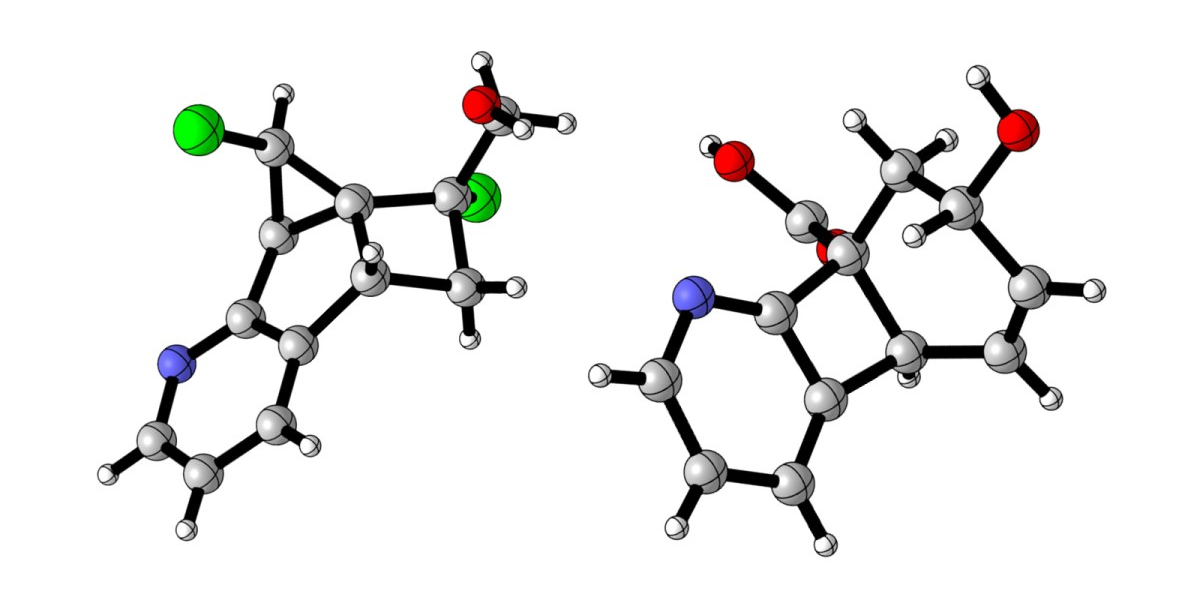
Peter Bellotti Chemists use light energy to produce small molecular rings
Team led by Frank Glorius finds new synthesis route for producing sensitive molecules under mild reaction conditions.
The team’s work has been published in the journal “Nature Catalysis”.
Neugebauer OC | 06.04.2022
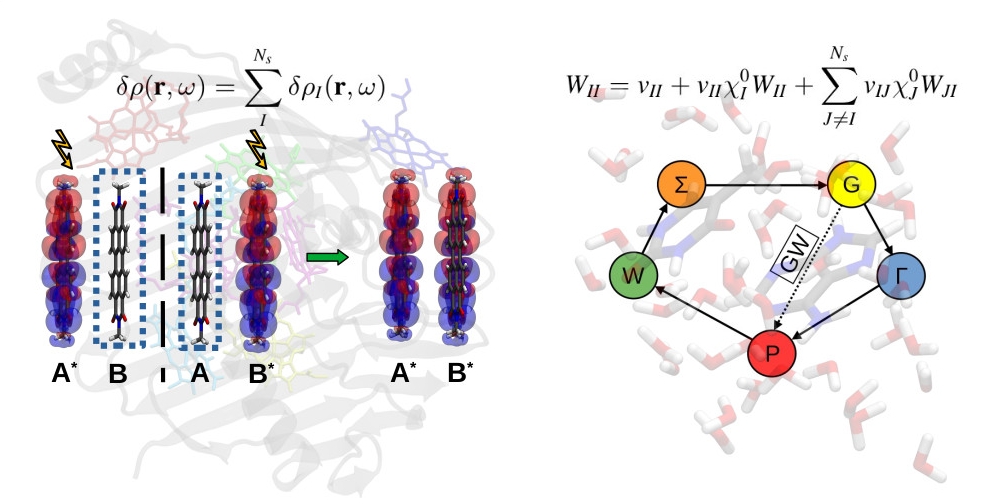
Johannes Tölle Peyerimhoff Prize for Theoretical Chemistry Münster
The Sigrid Peyerimhoff Doctoral Award of the Arbeitsgemeinschaft Theoretische Chemie (AGTC) goes this year to a scientist from Münster. Dr. Johannes Tölle from the group of Prof. Johannes Neugebauer received this prize for his dissertation entitled "Subsystem-Based Modeling of Photo-Induced Processes".
X-RAY OC | 28.03.2022

C. Daniliuc News from the OC: X-ray structure analysis department!
The Organic Chemistry Institute of WWU Münster is represented twice in the top 30 CSD authors (out of more than 450,000 unique author names) by the staff of the X-ray Structural Analysis Department.
According to CSD Author Statistics published in January 2022, Dr. Roland Fröhlich (former head of the X-Ray Department) and Dr. Constantin G. Daniliuc (head of the X-Ray Department) are ranked 19th and 28th worldwide.
Münster (upm) | 21.03.2022
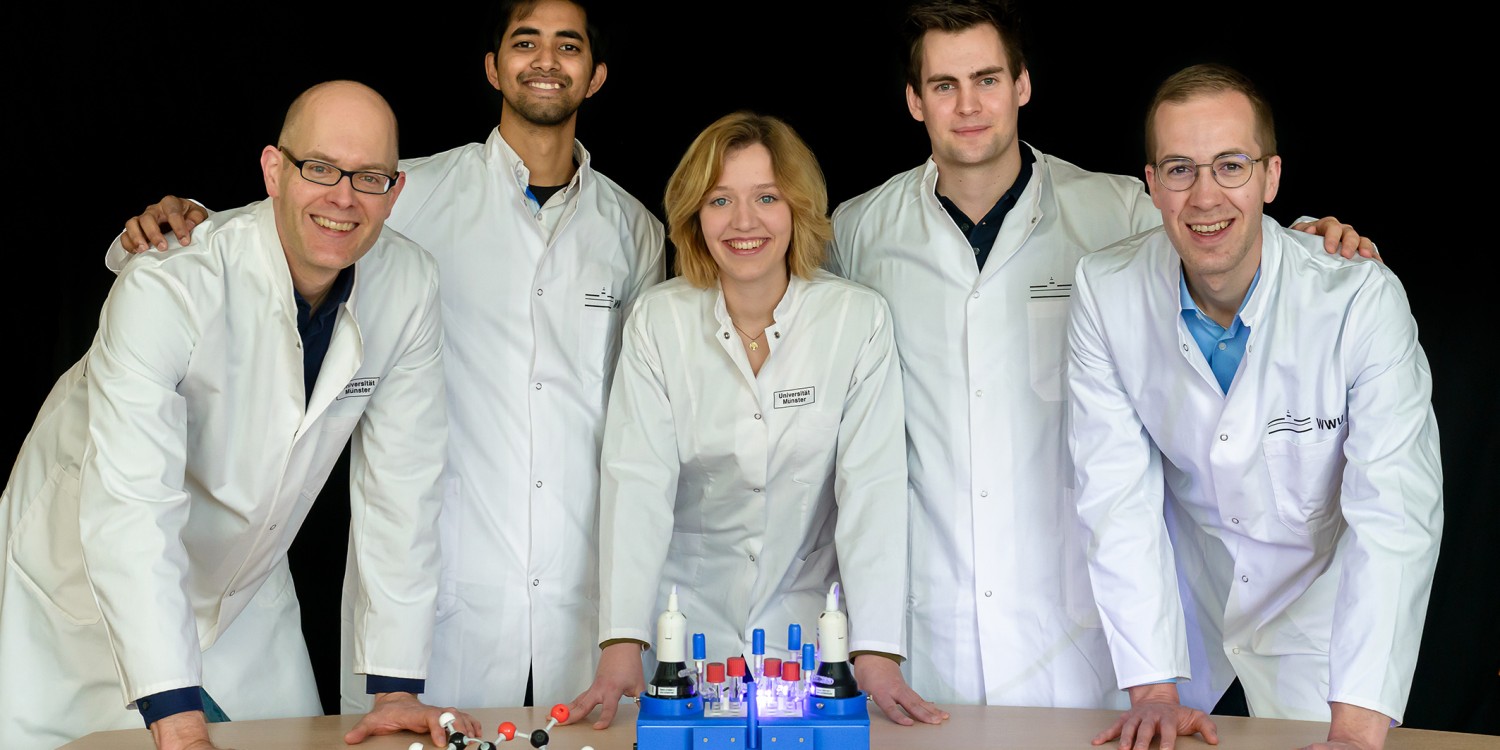
Uni MS - Peter Dziemba Chemists discover new reactivity of strained molecules
Light energy enables the reaction of double bonds with strained single bonds to produce three-dimensional molecules
A team led by Prof. Dr. Frank Glorius from the University of Münster has now succeeded in performing an unconventional cycloaddition in which a carbon-carbon double bond reacts with a carbon-carbon single bond.
Münster (upm) | 18.03.2022

Uni MS - Peter Dziemba Janssen Prize for Frank Glorius
Prof. Dr. Frank Glorius will receive the Janssen Prize for Creativity in Organic Synthesis. The award, endowed with 20,000 euros, recognises internationally outstanding achievements in the research field of organic synthesis, which are of particular importance for the development of new drugs. Frank Glorius is an internationally leading and particularly innovative scientist in the field of organic synthesis and catalysis.
Fachbereich Chemie und Pharmazie | 31.01.2022
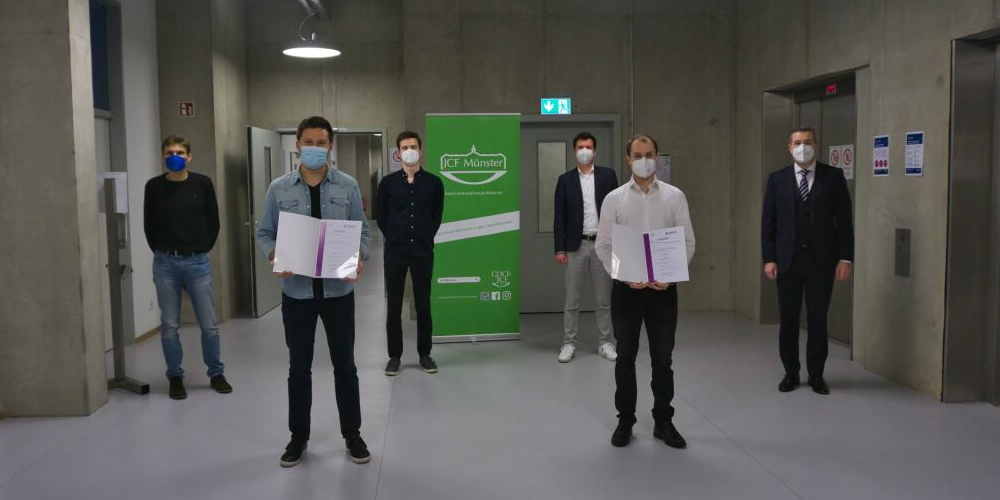
JCF - Nils Rendel Timo Stünkel and Constantin Stuckhardt received this year's Evonik Award for outstanding achievements during their theses. Timo Stünkel was able to convince with his contribution to the iodine-catalyzed synthesis of trifluorinated tetralins as part of his master's thesis. Constantin Stuckhardt received the prize for the publication on photoclick reactions of acylsilanes with indoles, which he completed during his doctoral thesis.
Münster (upm) | 12.01.2022
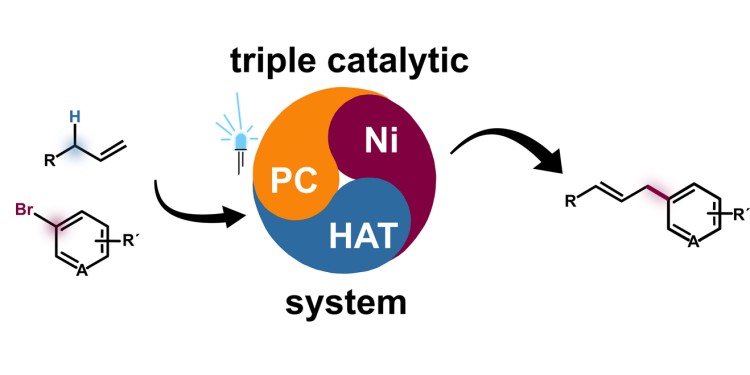
AG Glorius - Uni Münster "Hand in hand in hand": three catalysts solve chemical problem
The new method for arylation of unactivated alkenes is based on a ternary nickel(Ni)-hydrogen atom transfer (HAT) photodox (PC) synergy system (schematically shown in the middle). Left side: structural formula of an aryl group (top) and an unactivated alkene, right side: arylated alkene after synthesis.
2021
Münster (upm) | 22.11.2021
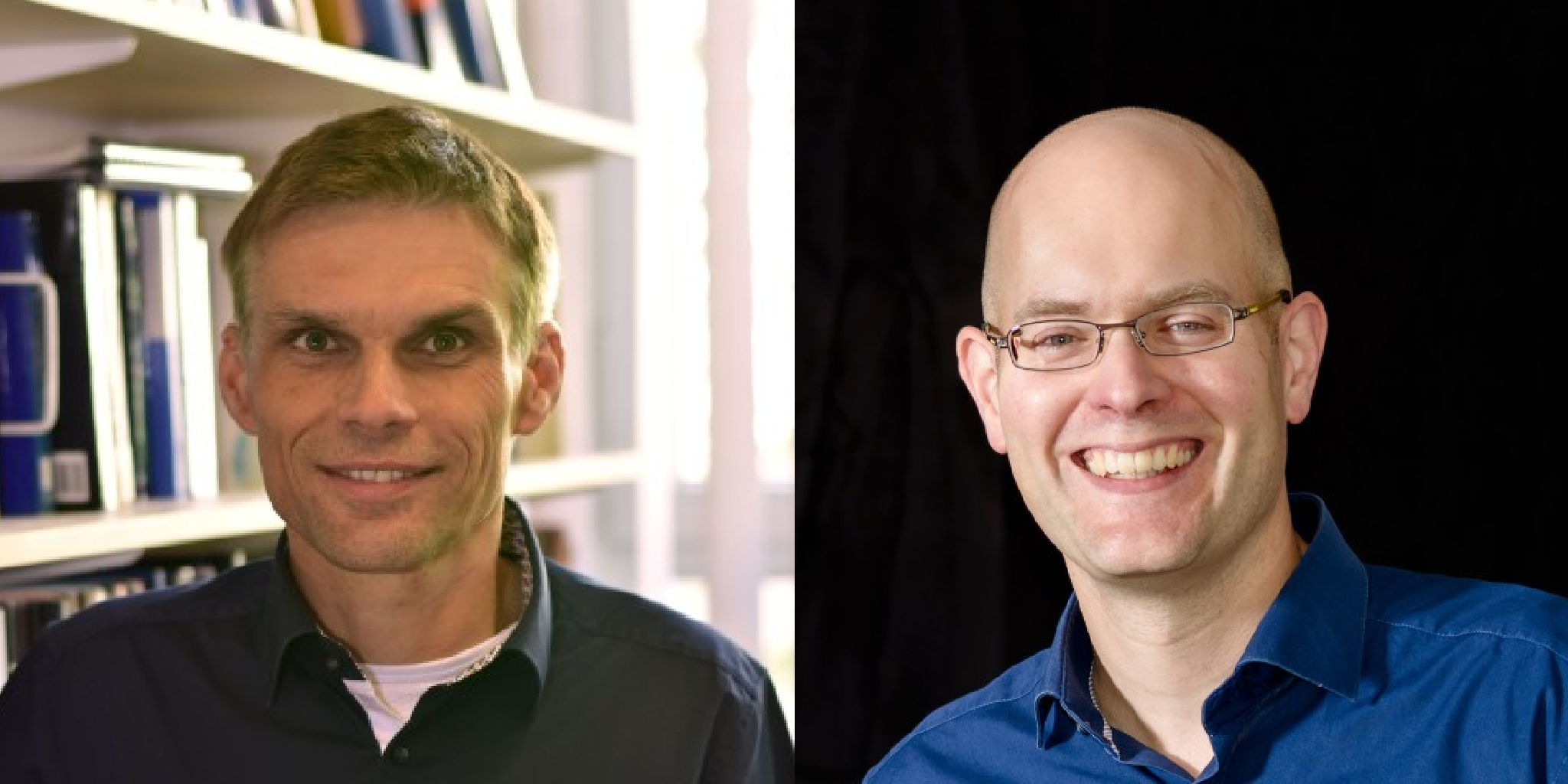
Armido Studer / Peter Dziemba Three scientists from the University of Münster are "highly cited"
The chemists Prof. Dr. Frank Glorius and Prof. Dr. Armido Studer of the Organisch-Chemisches Institut and the biologist Prof. Dr. Jörg Kudla are represented in the current citation ranking of the US company "Clarivate Analytics" and are thus among the most cited researchers worldwide.
Münster (upm/kk) | 28.06.2021

AK Studer "Academia Europaea" admits chemists from the University of Münster
Great honour for Prof. Dr. Armido Studer: The "Academia Europaea" has accepted the chemist from the Westfälische Wilhelms-Universität (WWU) Münster as a new member. The Academia Europaea awards membership to individuals who have demonstrated "sustained academic excellence".
Münster (upm) | 21.06.2021
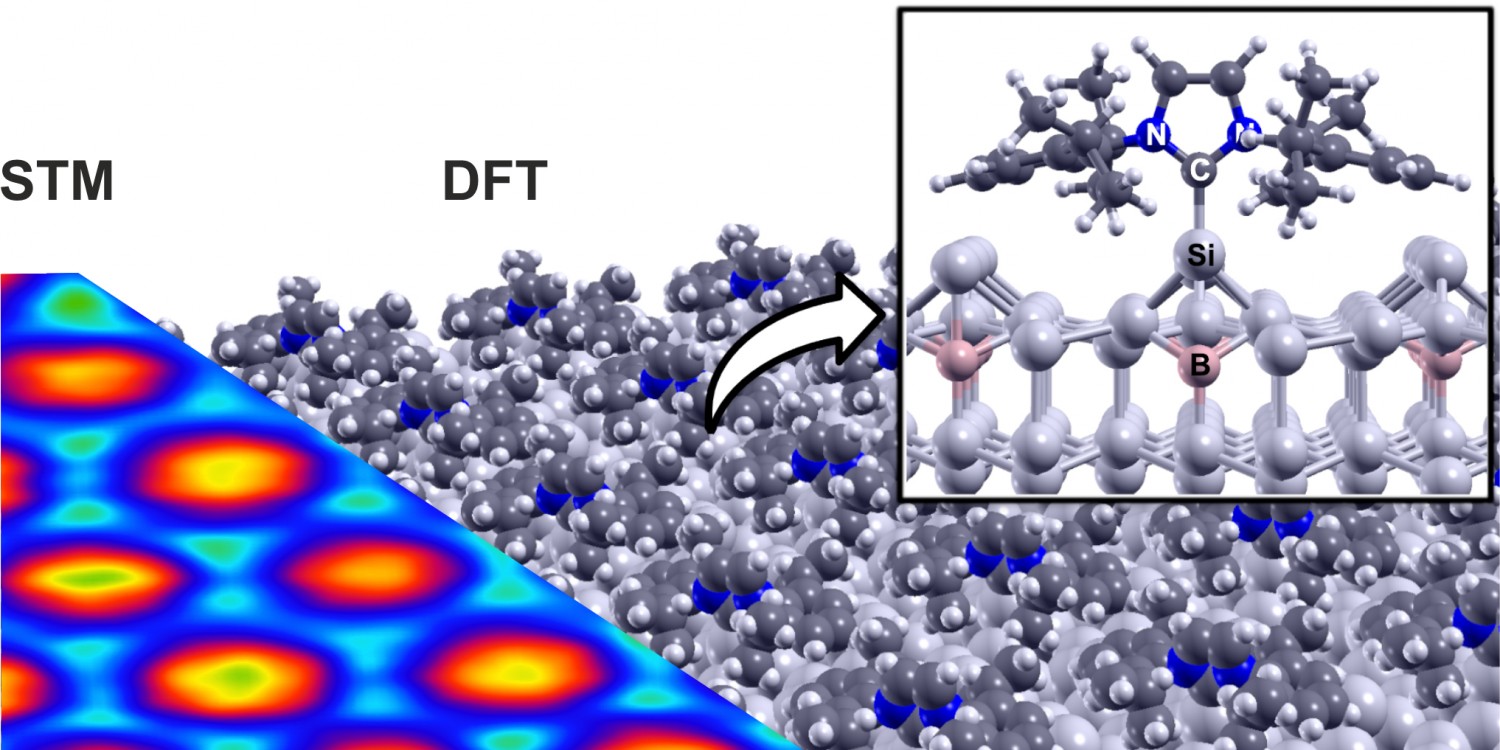
Dr. Hazem Aldahhak und Dr. Martin Franz New method for molecular functionalization of surfaces
Arbitrarily smaller structures for functionalizing semiconductor materials such as silicon cannot be produced using the approaches of classical technology. Scientists have now presented a new approach in the journal Nature Chemistry: They show that stable and yet very well-ordered molecular single layers can be produced on silicon surfaces - by self-assembly. To do this, they use N-heterocyclic carbenes.
Münster (upm) | 14.06.2021

Dr. Manuel van Gemmeren Lecturer Award goes to chemist at the University of Münster
Chemist Dr. Manuel van Gemmeren has received the Lecturer Award of the “Fonds der Chemischen Industrie”. He accepted the award, which is endowed with 75,000 euros, at a virtual conference. With his research group, the scientist has been studying so-called carbon-hydrogen C–H-functionalizations since 2016. These are chemical reactions with which stable C-H bonds can be converted into complex target structures.
Münster (upm) | 21.05.2021
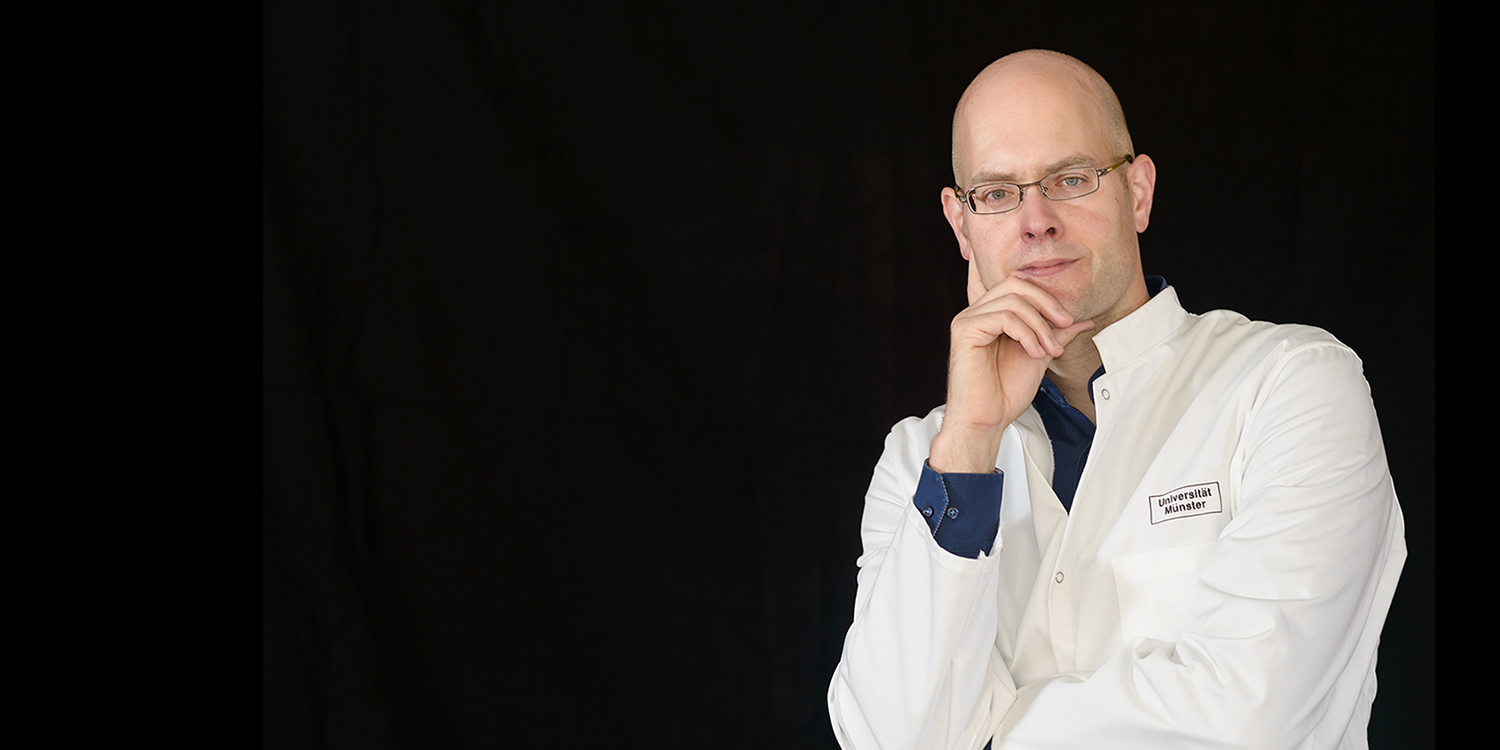
Uni MS - Peter Dziemba National Academy Leopoldina admits chemists from the University of Münster
Great honour for Prof. Dr. Frank Glorius: The chemist is a new member of the National Academy of Sciences Leopoldina. With this election, the oldest scientific-medical learned society in the German-speaking world honours his extraordinary scientific achievements in the field of catalysis chemistry and the development of functional molecules.
Münster (upm/kk) | 10.05.2021
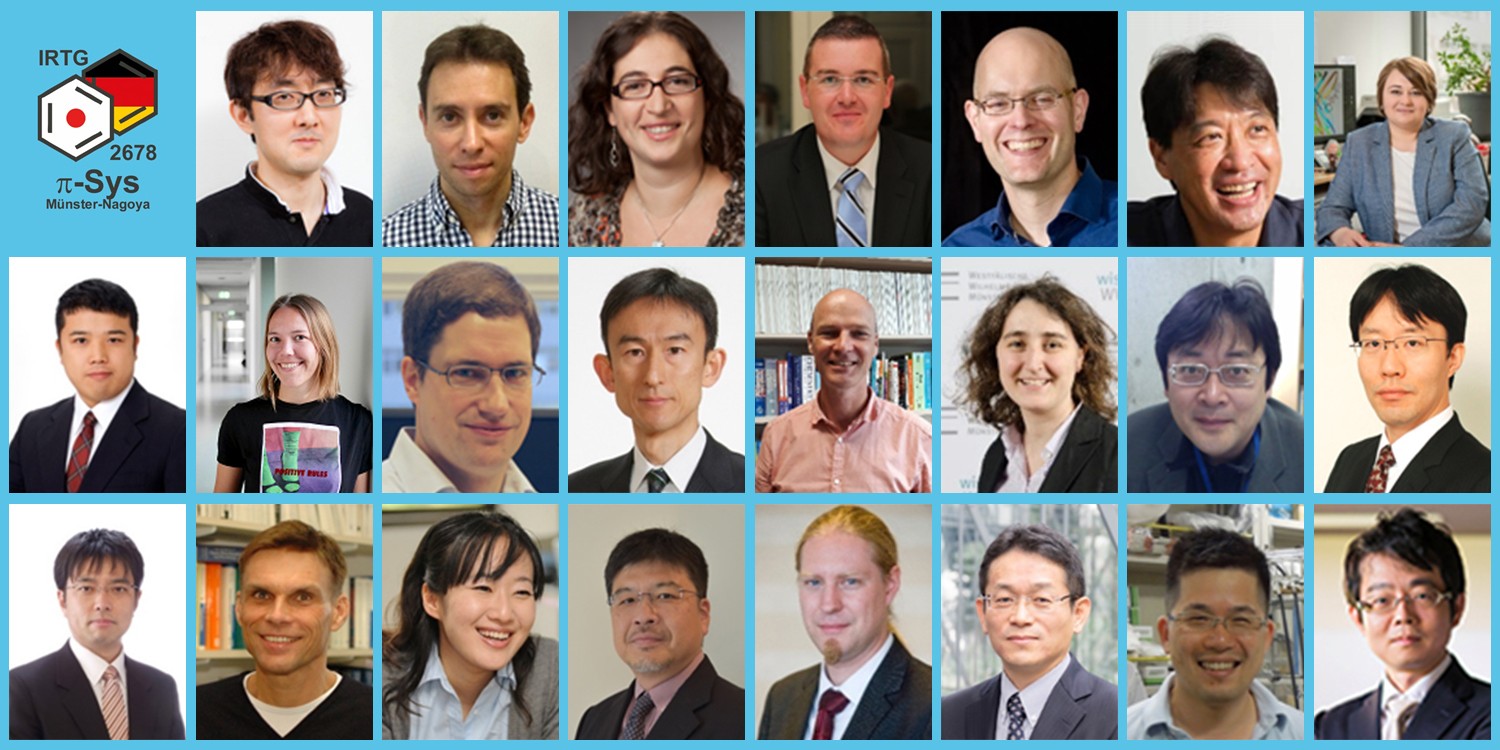
Uni MS - AK Studer German Research Foundation approves new Research Training Group
The University of Münster is establishing a new Research Training Group funded by the German Research Foundation (DFG). The bilateral doctoral program "Functional pi-Systems: Activation, Interaction and Application" will start in May and will receive funding of around five million euros for four and a half years.
Münster (upm) | 30.03.2021
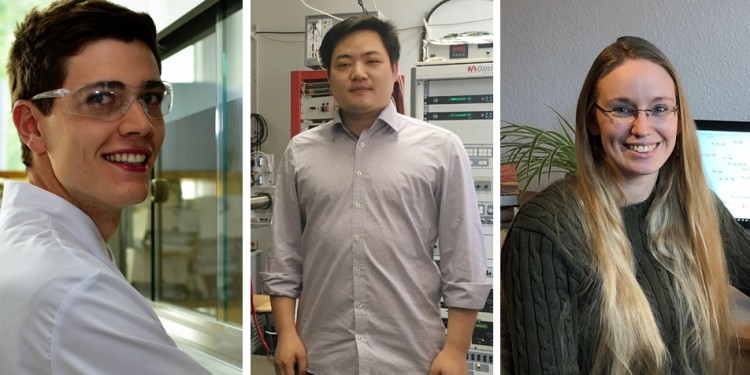
Uni MS - privat Researchers first to link silicon atoms on surfaces
Many reactions have been developed in surface chemistry and interesting materials have been produced for potential applications. Most reactions are based on the formation of carbon-carbon bonds. A team from various working groups in chemistry and physics has now used silicon-silicon bonds to construct a polymer - a premiere in surface chemistry.
Münster (upm/jah) | 30.03.2021
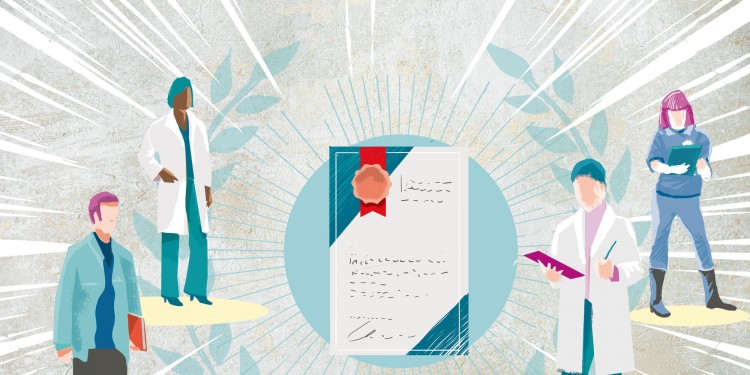
Uni MS - Robert Matzke Ryan Gilmour elected to the Royal Society of Edinburgh
Prof. Dr. Ryan Gilmour has been elected to the Royal Society of Edinburgh (RSE). As one of seven personalities elected as „Corresponding Fellow“, the chemist joins the ranks of distinguished Fellows resident abroad. “This is the greatest honour of my professional career to date and I look forward to strengthening the bonds between the two countries that I call home”, says Ryan Gilmour.
Münster (upm/kk) | 29.03.2021

Uni MS - Robert Matzke Münster University receives two new research associations
The German Research Foundation (DFG) has approved two new Priority Programmes (SPP): Bioinformatician Prof Erich Bornberg-Bauer from the Institute of Evolution and Biodiversity is leading the project "Genomic Basis of Evolutionary Innovations (GEvol)", and Chemist Prof Frank Glorius is coordinating the project "Use and Development of Machine Learning for Molecular Applications - Molecular Machine Learning".
Münster (upm) | 25.03.2021

AK Glorius Breakthrough in the production of three-dimensional molecular structures
A major goal of organic and medicinal chemistry in recent decades has been the rapid synthesis of three-dimensional molecules for the development of new drugs. Chemists led by Prof. Frank Glorius, Prof. M. Kevin Brown and Prof. Kendall N. Houk have now succeeded in converting several classes of flat nitrogen-containing molecules into the desired three-dimensional structures. This study has now been published in the journal “Science”.
Münster (upm/jah) | 04.01 2021
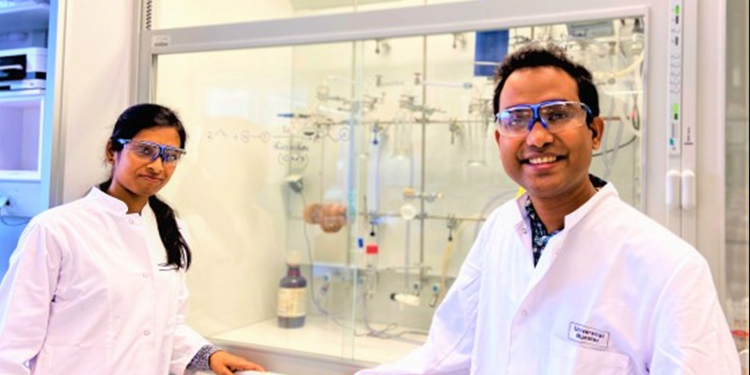
Uni MS - Glorius Group Chemists succeed in synthesis of aminoalcohols by utilizing light
Vicinal aminoalcohols are high-quality organic compounds that are found in many everyday products. For a long time, chemists are trying to develop efficient methods of synthesizing them. In their recent study published in the journal Nature Catalysis, scientists led by Prof. Dr. Frank Glorius have found a solution for the production of a special variant of aminoalcohols.
2020
Alexander von Humboldt-Stiftung | 24.12.2020
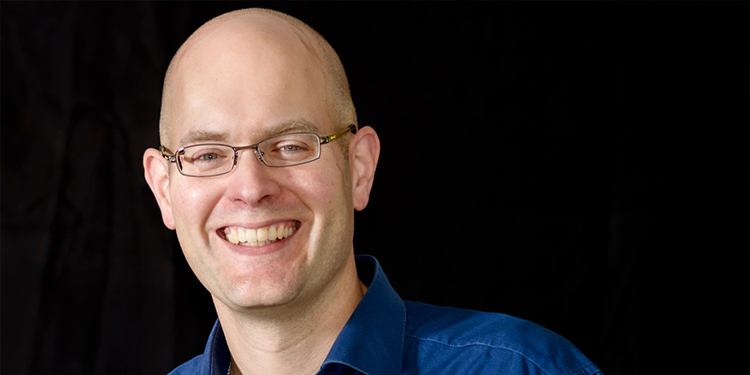
Dr. Peter Dziemba, Uni MS First Humboldt Scouts selected for the Henriette Herz Scouting Program
The 33 scouts - 23 men and ten women - from 26 universities and research institutions were selected in the first round from a total of 78 applications. People from 46 institutions applied. The Westfälische Wilhelms-Universität in Münster provided three scouts.
Münster (upm/kk) | 27.11.2020
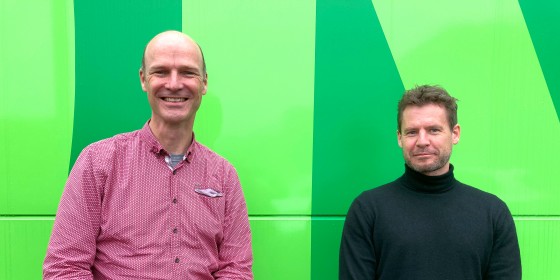
Melissa Pernice Over 20 million euros for two new research alliances
The German Research Foundation (DFG) is funding two new Collaborative Research Centres (CRC). The two research alliances – entitled “inSight – Multiscale imaging of organ-specific inflammation” and “Intelligent matter: From responsive to adaptive nanosystems” – will together be receiving funding of more than 20 million euros. The projects will be starting in January 2021, running initially for four years.
FilmLAB Uni Münster | 19.11.2020
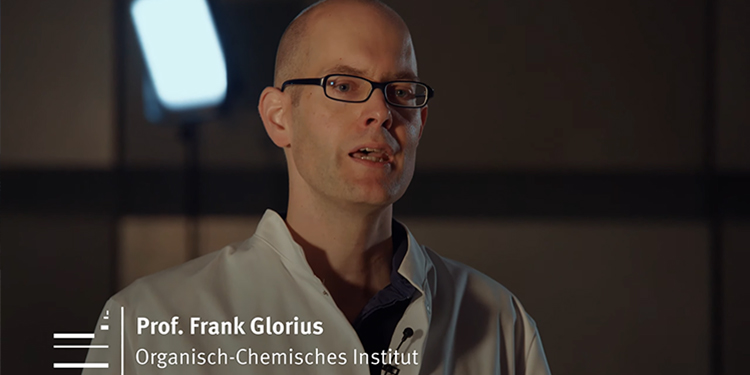
FilmLAB Uni Münster Chemistry is anchored in our everyday lives in many different ways - from beer brewing, dyes and detergents to the energy transition. In their show lecture "Chemistry is cult(ure)!", Prof. Frank Glorius, Felix Strieth-Kalthoff and Peter Eggert use exciting experiments to show where we encounter chemistry every day. The chemists also explain how we make use of chemical reactions in everyday life - and what can go wrong in the process.
Münster (upm/kk) | 03.09.2020

Dr. Manuel van Gemmeren ERC Starting Grant for Manuel van Gemmeren
The European Research Council (ERC) has awarded Dr. Manuel van Gemmeren an ERC Starting Grant worth 1.5 million euros. The EU-funded research project that van Gemmeren will lead over the coming five years, belongs to the field of organic chemistry. Since 2016, the researcher and his working group at Münster University have been studying so-called C-H-functionalizations.
Münster (upm) | 05.08.2020
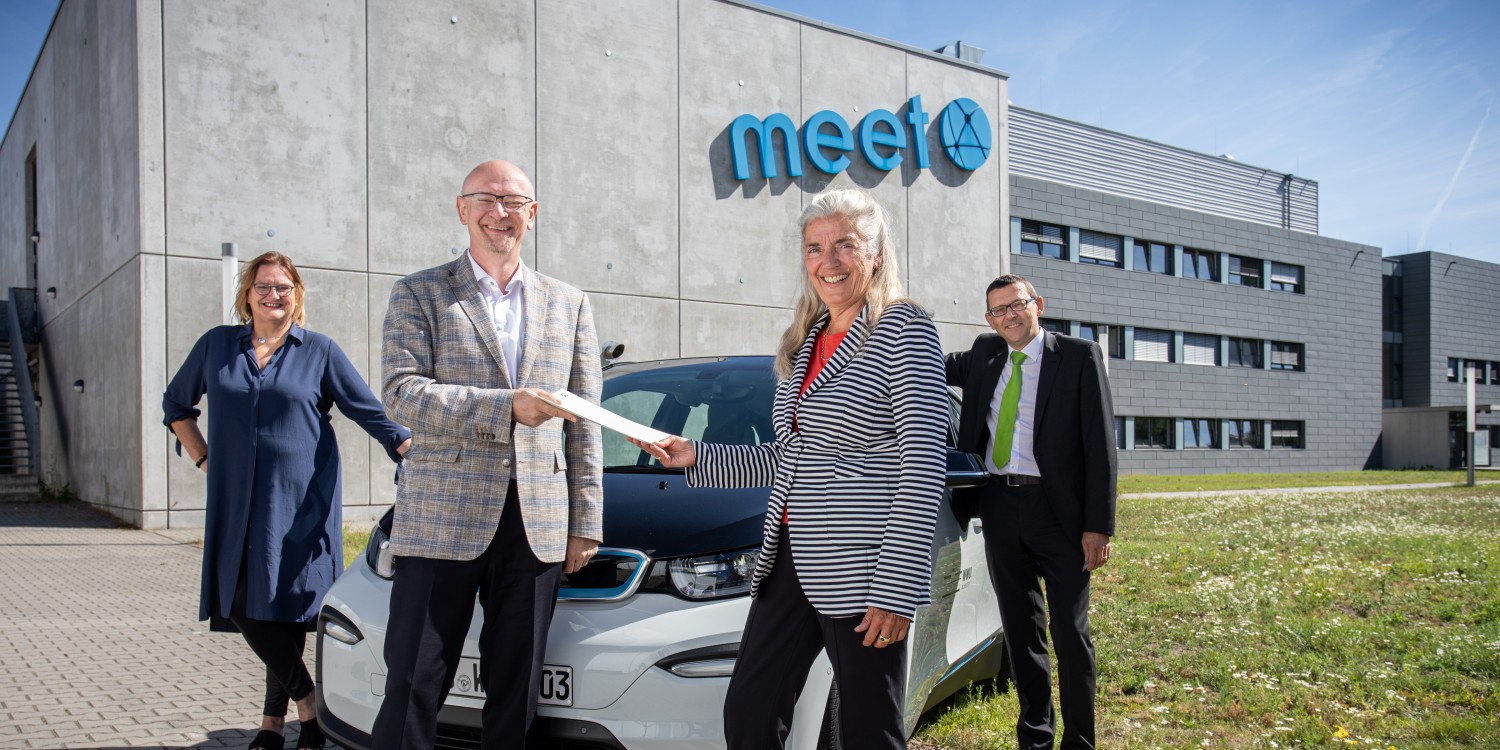
Uni MS - Peter Leßmann Battery Research Centre: new international research school opened
Longer ranges for electric vehicles and the effective storage of electricity from renewable energies – these are research topics for the future which doctoral students in Münster will be working on in a new international Graduate School. The research centre for “Battery Chemistry, Characterization, Analysis, Recycling and Application” (BACCARA) was set up with the participation of the Department of Chemistry and Pharmacy and the Helmholtz Institute Münster and is funded by the state of North Rhine-Westphalia with 9.5 million euros for over five years.
Münster (upm/kn) | 03.08.2020

AK Studer Münster University chemist admitted to "Leopoldina" Academy
A chemist at the University of Münster is awarded a great honour: the National Academy of Sciences, “Leopoldina”, recently appointed Prof. Armino Studer as a new member. In doing so, the Academy acknowledges his outstanding scientific achievements. “For me, it is a very special accolade to be part of the oldest society of scientific and medical scholars in German-speaking countries,” says Armido Studer.
Münster (upm/sr) | 21.07.2020

Dr. Peter Dziemba, Uni MS Frank Glorius receives award for catalysis science
For his work in the field of catalysis science, the chemist Prof. Frank Glorius has received the "2020 Mitsui Chemicals Catalysis Science Award". The prize, endowed with 5 million yen (almost 41,000 euros), is awarded every two years to outstanding chemists under 47 years of age. This year's focus is sustainability, to highlight the social issues including plastic waste management.
Münster (upm/sr) | 17.07.2020
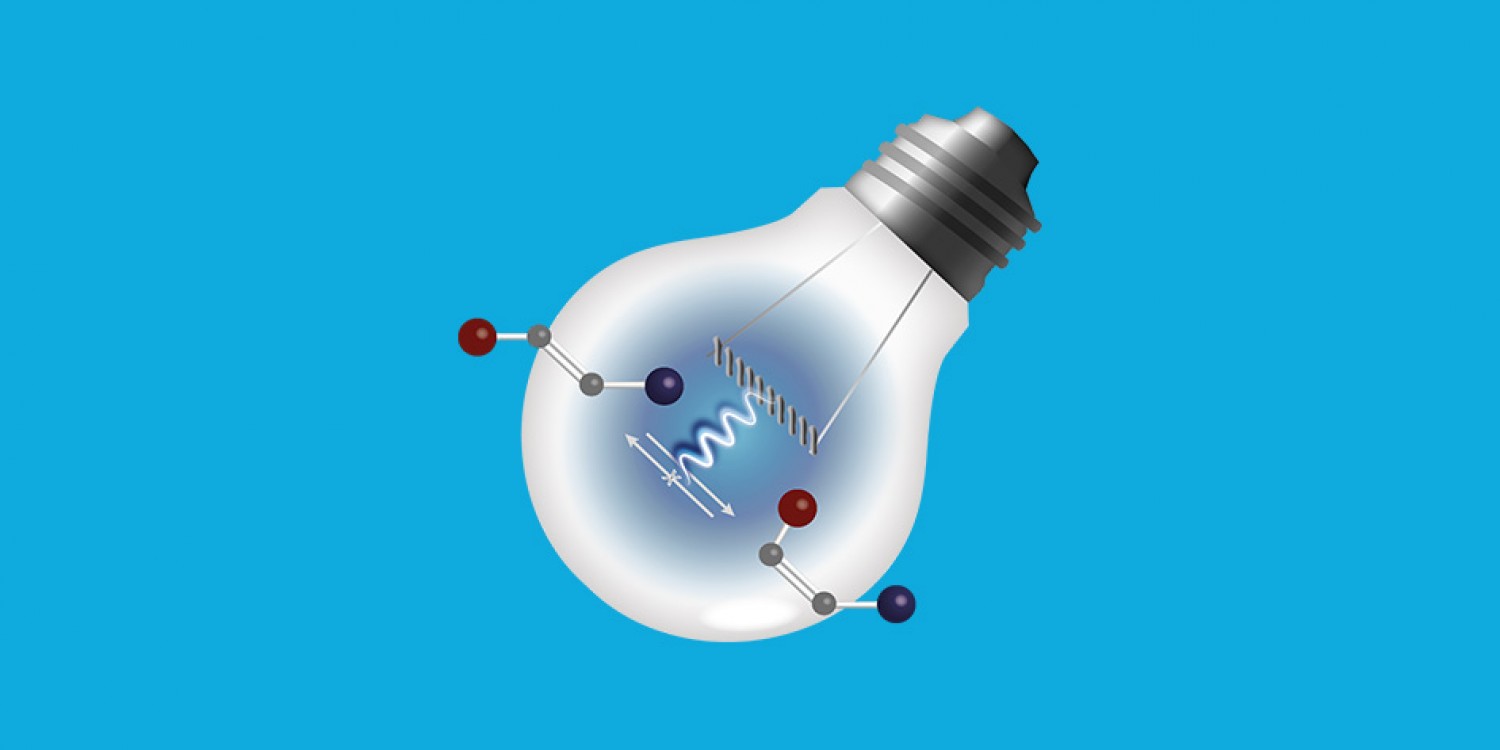
Prof. R. Gilmour Researchers solve a long-standing problem in organic chemistry
They occur in nature, are reactive and play a role in many biological processes: polyenes. Scientists headed by Prof. Ryan Gilmour succeeded in constructing complex polyenes such as retinoic acid from simple, geometrically well-defined alkene building blocks. To do this, the scientists used small molecules as "antennas" which they excited with light, thereby enabling difficult chemical reactions to proceed via a process known as “Energy Transfer Catalysis”.
Münster (upm/bhe) | 01.07.2020
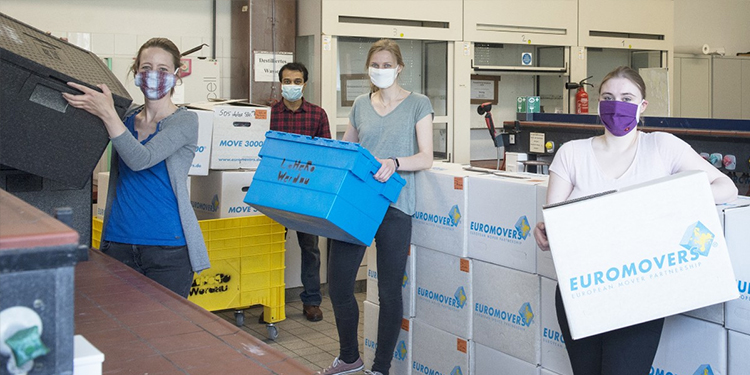
Uni MS - Brigitte Heeke Complicated, sensitive and time-consuming
Dr. Patrick Zeni, together with his colleague Dr. Ludger Tebben and many others involved, is organizing a move of superlatives. The Organic Chemistry and Biochemistry building is the newest new building at the WWU. Highly sensitive technology, fragile materials, hazardous substances, complex ventilation concepts: Due to the special requirements for a chemical institute, it is also a particularly complicated move.
Münster (upm/bhe) | 01.07.2020
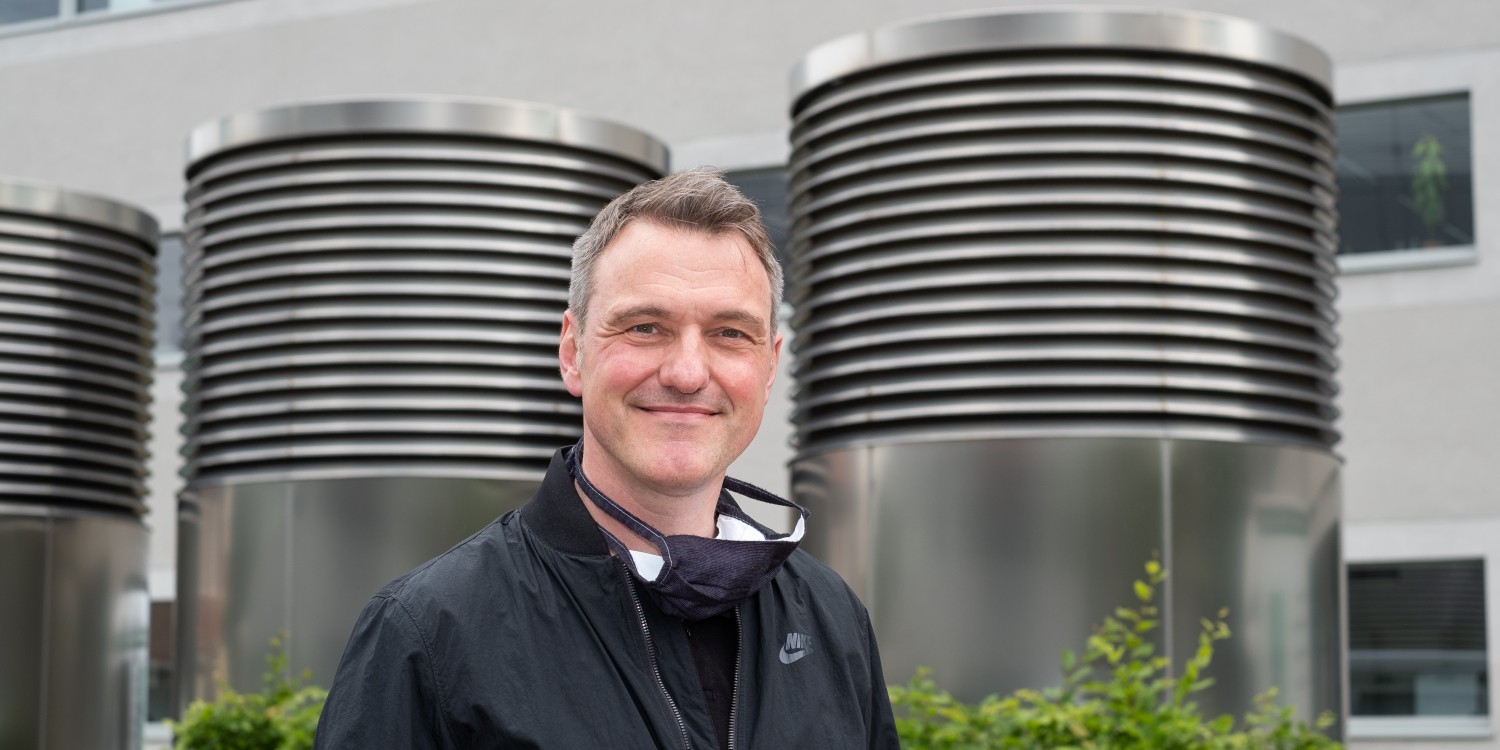
Uni MS - Peter Leßmann Describing the handling of each individual substance in such detail that it can be transported to the other building in accordance with safety regulations would fill entire books. No one here has enough time to write this down for third parties, despite their commitment. The working groups are therefore better off moving their own things themselves. Our employees are trained to handle sensitive substances. A molecule that you have spent three years researching for your dissertation is something you know best yourself and don't entrust to anyone else.
Münster (upm) | 27.04.2020
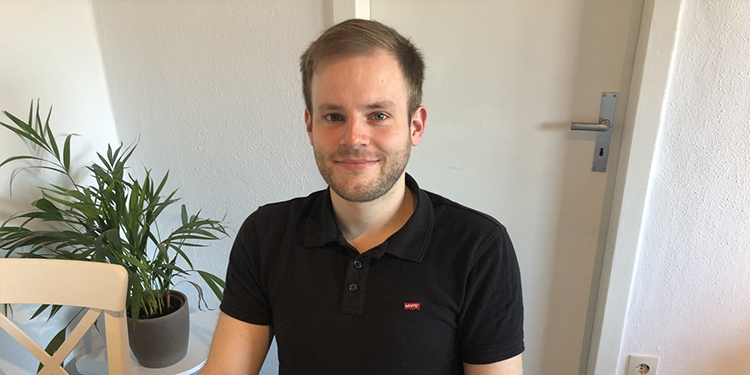
privat WWU-Cast Special: Research in times of Corona
Maximilan Koy is a doctoral student in the Glorius group at the Institute of Organic Chemistry. In the podcast, he talks about how he experiences the current situation as a scientist, how his working group is organized and how he uses the time for his doctorate effectively.
Münster (upm) | 24.03.2020
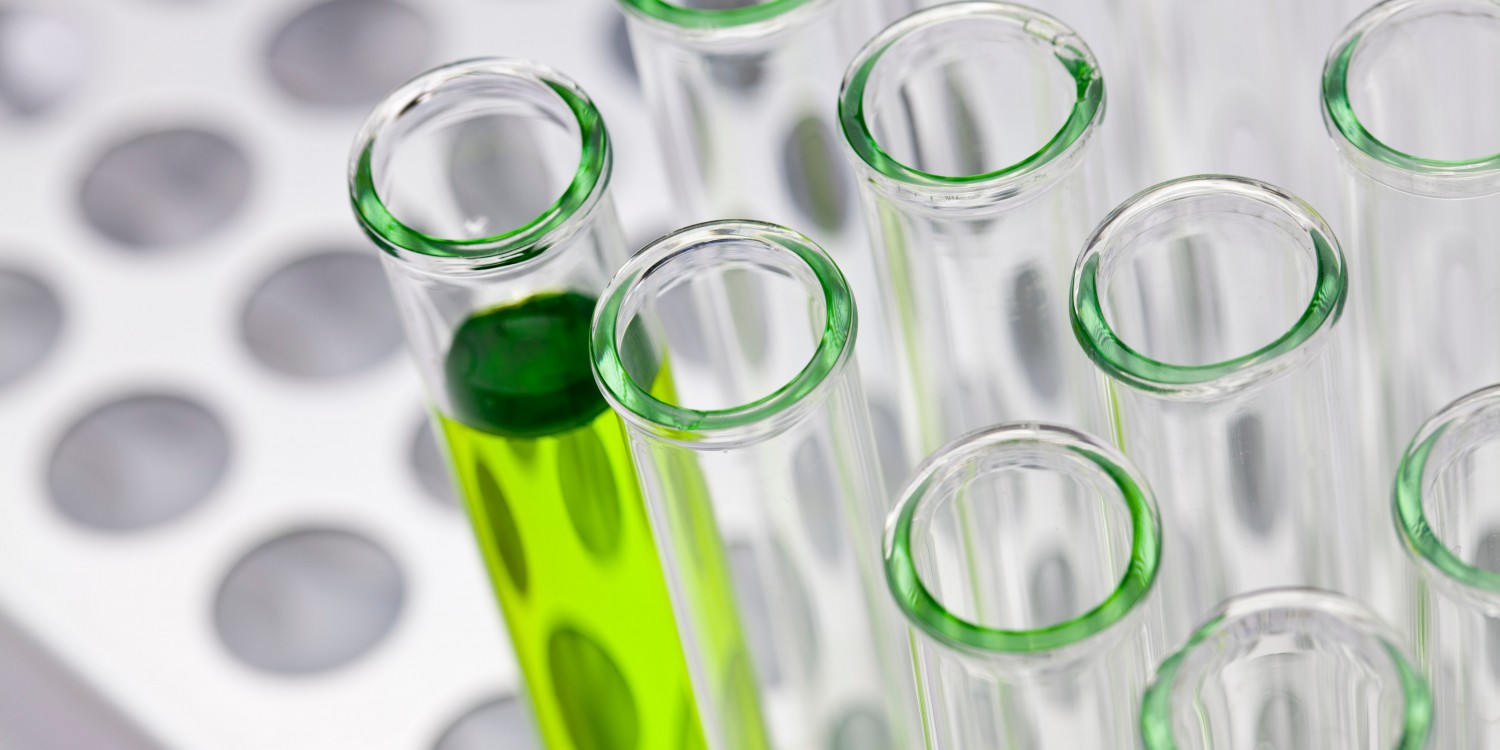
Bill Oxford/Unsplash Activating palladium catalysis by light: teaching an old transition metal new tricks
In the production of compounds, chemists have the fundamental goal of finding strategies that are most selective and avoid waste products. In this context, allylic substitution reactions using catalysts have already led to significant advances in science. The catalysts cause that in a molecule a functional group is replaced by another group in allylic position, i.e. in direct proximity to a carbon-carbon double bond.
DECHEMA e.V. | 10.02.2020

Dr. Peter Dziemba, Uni MS Highly innovative and efficient synthesis methods Otto-Roelen-Medal for Frank Glorius
Prof. Frank Glorius from Westfälische Wilhelms-Universität Münster / Germany receives the Otto-Roelen-Medal 2020. This prize will be awarded by DECHEMA and the German Catalysis Society in recognition of his developments in the field of chemo- and stereoselective hydrogenation of aromatics.
Münster (upm) | 17.01.2020
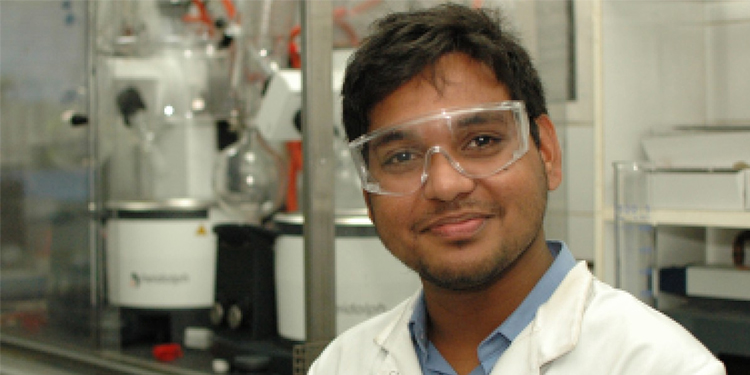
Kalipada Jana Chemists allow boron atoms to migrate
Organic molecules with atoms of the semi-metal boron are among the most important building blocks for synthesis products that are needed to produce drugs and agricultural chemicals. Chemists have now succeeded in significantly expanding the range of applications of commercially and industrially used boron compounds, so-called allylboronic esters. The study has been published in the scientific journal "Chem".
2019
Münster (upm/sr) | 06.12.2019

Dr. Manuel van Gemmeren Emmy Noether Programme: 1.7 million euros for chemist
Dr. Manuel van Gemmeren, a chemist, convinced with his science: The German Research Foundation funds the junior scientist from the University of Münster with almost 1.7 million euros. This will enable him to set up his own research group at the Institute of Organic Chemistry over the next six years.
Münster (upm/sr) | 29.11.2019
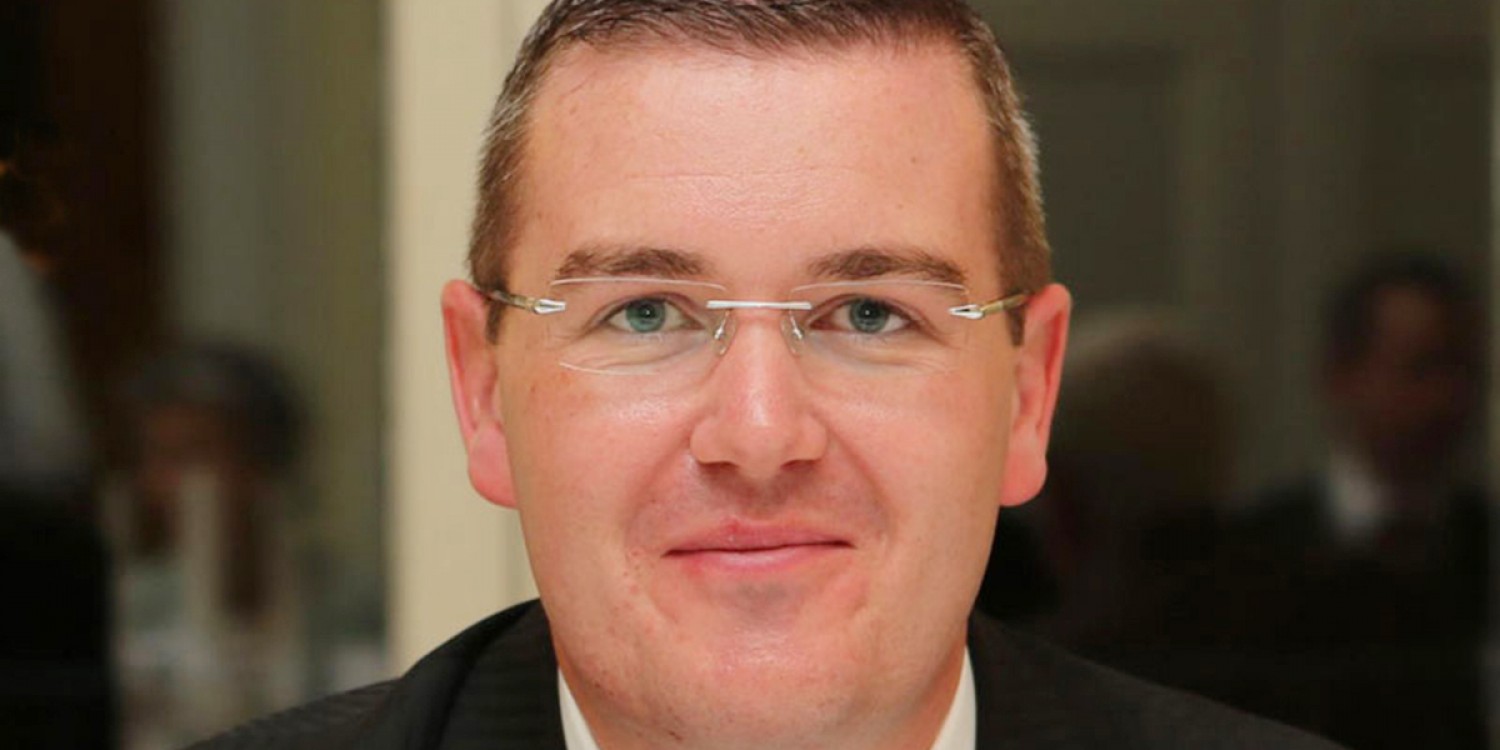
privat Technion in Israel awards Ryan Gilmour
Prof. Ryan Gilmour has been appointed "Prof. David Ginsburg Lecturer" at the Technion – Israel Institute of Technology for the academic year 2020/21.
Dr. Mück-Lichtenfeld | 12.10.2019
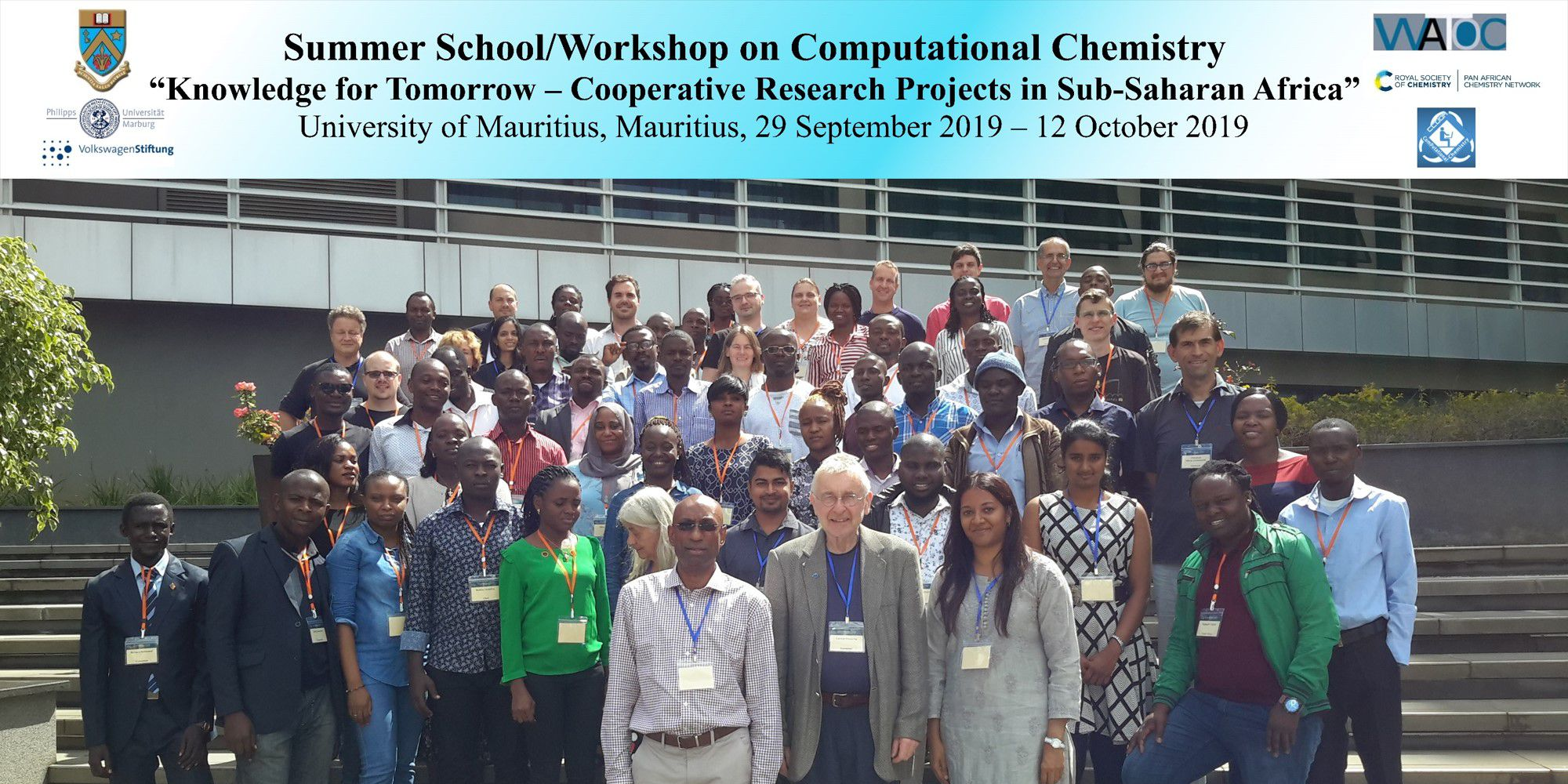
Dr. Mück-Lichtenfeld In the first two weeks of October, a workshop funded by the Volkswagen Foundation was held in Mauritius for young scientists from Central and Southern African countries. Dr. Christian Mück-Lichtenfeld (Institute of Organic Chemistry) from the WWU was involved and organized the daily practical exercises on the PC.
Münster (upm/sr) | 08.05.2019

Uni MS - Peter Dziemba International award for Frank Glorius
Prof. Frank Glorius, an organic chemist at the University of Münster, has been awarded the Gay-Lussac Humboldt Prize for his outstanding research and his close links to France in his work. He received the prize in Paris on May 7th.
Münster (upm/sr) | 07.05.2019
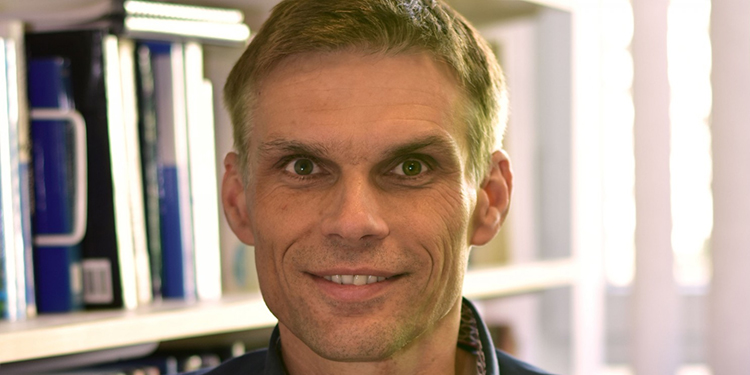
Prof. A. Studer Royal Society of Chemistry honours Armido Studer
International Award for Organic Chemist at the Westfälische Wilhelms-Universität Münster (WWU): Prof. Dr. Armido Studer is this year's winner of the "Pedler Award", which is awarded by the British "Royal Society of Chemistry".
Münster (upm) | 18.02.2019
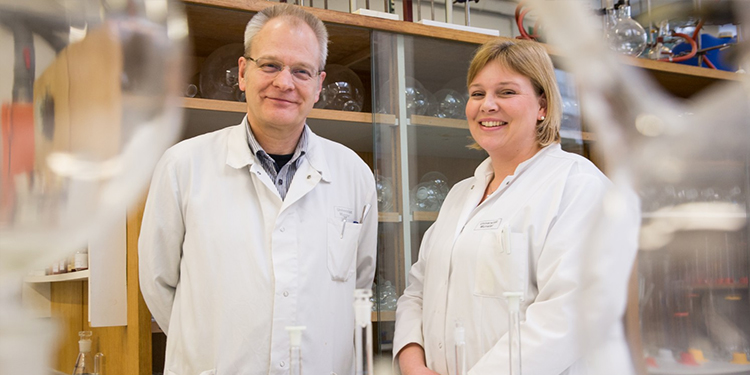
Uni MS - Peter Leßmann Our trainees should use the opportunities they are given here
In addition to providing facilities for studies and research, the University of Münster offers apprenticeships and vocational training in 19 different occupations – from gardener to IT systems technician. One example of this vocational training is that for chemical laboratory assistants at the Institute of Organic Chemistry.
Münster (upm) | 22.01.2019
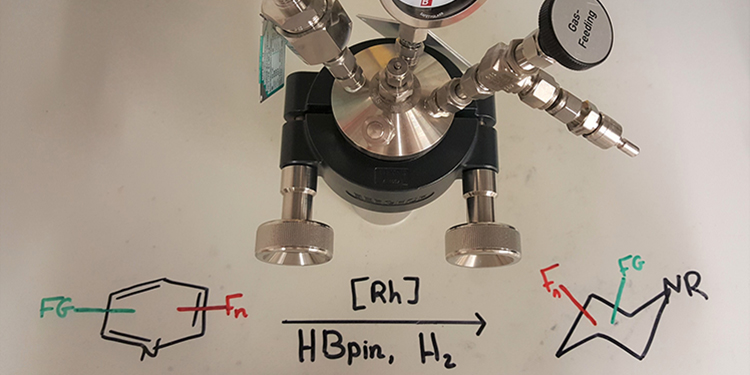
Prof. F. Glorius Chemists develop new synthesis method for producing fluorinated piperidines
Münster University researchers publish study in "Nature Chemistry". The study – written by Dr. Zackaria Nairoukh, Marco Wollenburg, Dr. Christoph Schlepphorst, Dr. Klaus Bergander and Prof. Frank Glorius – has just been published in the online edition of the Nature Chemistry journal.
Münster (upm/ja) | 16.01.2019
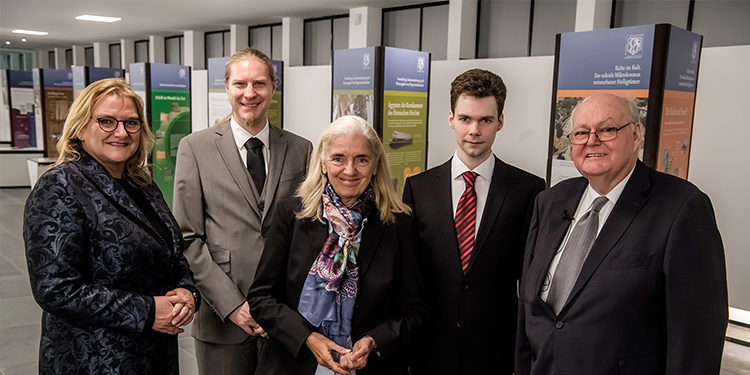
AKW NRW - Andreas Endermann Two WWU Scientists Become Members of the Junges Kolleg
On Tuesday evening (January 15th), the two outstanding junior scientists Manuel van Gemmeren and Raphael Wittkowski from the University of Münster have been welcomed by the North Rhine-Westphalian Academy of Sciences, Humanities and the Arts (AWK NRW) in Düsseldorf as new members of the Junges Kolleg.
2018
Münster (upm/kk) | 03.12.2018

privat Grants worth millions for Münster University lawyer and chemist
Two "Consolidator Grants" 2018 of the European Research Council (ERC) have been awarded to scientists at the University of Münster (WWU): The lawyer Prof. Dr. Niels Petersen and the chemist Prof. Dr. Ryan Gilmour each receive one of the coveted grants worth a total of 3.6 million euros.
Münster (upm) | 20.11.2018
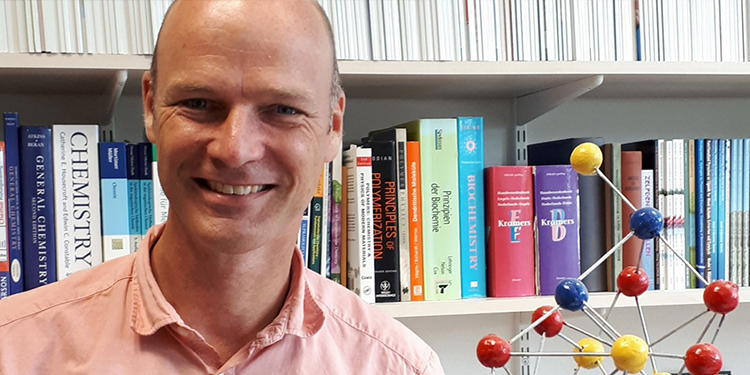
Uni MS - Bart Jan Ravoo Chemists develop new method for selective binding of proteins
A new method for selectively binding proteins to nanoparticles has been described by a German-Chinese research team led by chemist Prof. Dr. Bart Jan Ravoo. The nanoparticles automatically recognize specific peptides, i.e. very small proteins, and form a highly selective bond with them. Among the peptides that the scientists examined were amyloids, whose deposits play a central role in Alzheimer's disease. The study has just been published in the journal "Nature Chemistry".
Münster (upm/jas) | 17.05.2018
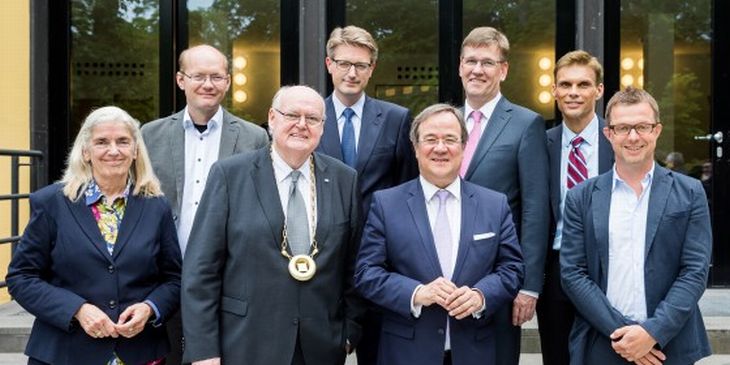
AWK NRW NRW Academy admits four new members of WWU
The North Rhine-Westphalian Academy of Sciences, Humanities and the Arts has accepted twelve new members. These include the psychologist Prof. Dr. Gerald Echterhoff, the planetologist Prof. Dr. Thorsten Kleine, the chemist Prof. Dr. Armido Studer and the mathematician Prof. Dr. Burkhard Wilking from the University of Münster.
Münster (upm/ch) | 08-05-2018
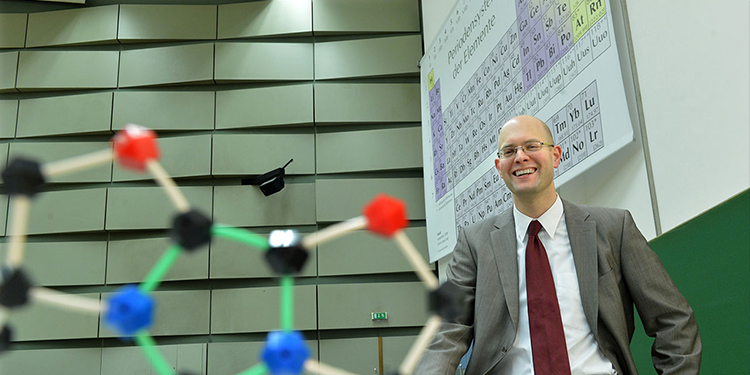
DFG/David Ausserhofer 2018 Merck, Sharp & Dohme Award Winner: Professor Frank Glorius
Dr. Frank Glorius has received an award from the British Royal Society of Chemistry. With the "Merck, Sharp & Dohme Award", the society recognizes his outstanding achievements in the field of hydrogenation of aromatic molecules.
Münster (upm) | 16.04.2018
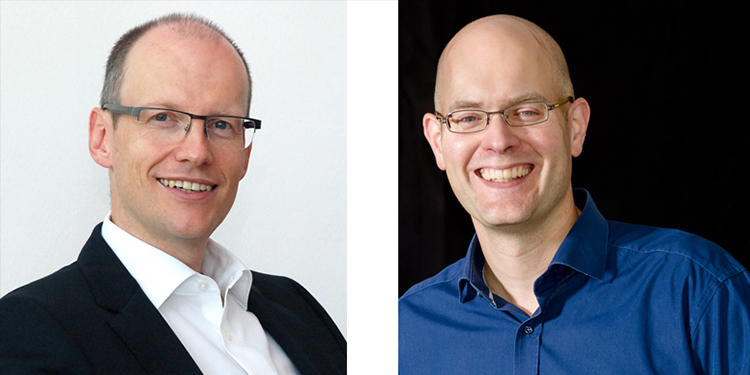
MPI Münster, J. Müller-Keuker / Uni MS, P. Dziemba "ERC Advanced Grants” for Ralf Adams and Frank Glorius
Two 2018 Advanced Grants from the European Research Council (ERC) have been awarded to scientists at the University of Münster (WWU) and the Max Planck Institute (MPI) for Molecular Biomedicine in Münster: biochemist Dr. Ralf Adams and chemist Dr. Frank Glorius will each receive funding of around 4.7 million euros. The ERC grants provide funding for research projects and at the same time are regarded as proof of the outstanding research achievements of the scientists.
2017
Münster (upm) | 11.08.2017
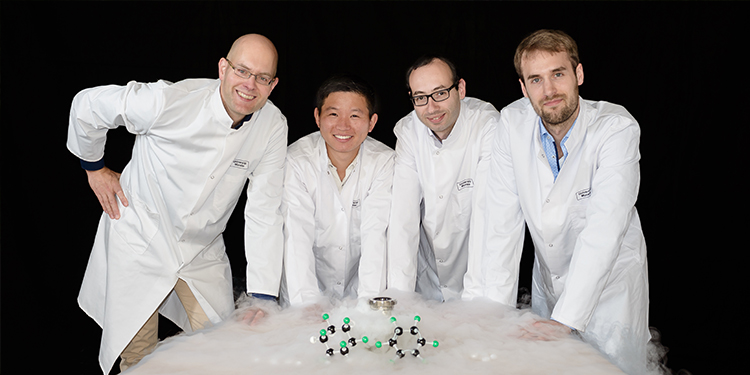
Dr.Dziemba Chemists develope a new method for the formation of fluorinated molecular rings
Chemists have made the previously impossible possible: they have developed a new, easy-to-perform synthesis method for the production of such fluorine-bearing three-dimensional saturated (consisting only of single bonds) molecular ring structures. The study by Prof. Dr. Frank Glorius, Mario Wiesenfeldt, Dr. Zackaria Nairoukh and Dr. Wei Li has been published online in the journal "Science".
Glorius | 24.05.2017
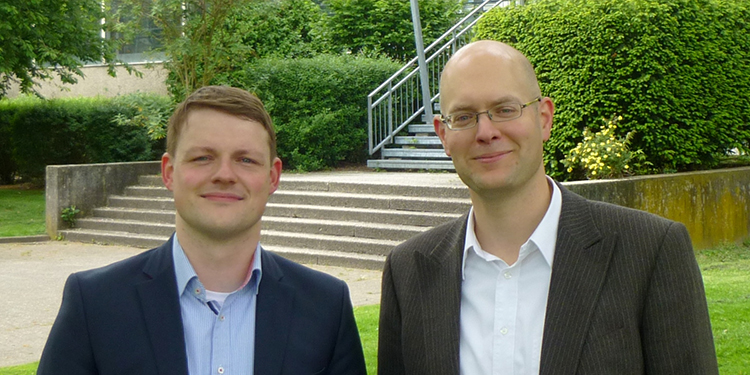
Prof. F. Glorius Awards for PhD student and supervisor
Prof. Frank Glorius from the Institute of Organic Chemistry receives a "Faculty Advisor Award" from the International Precious Metals Institute (IPMI), endowed with USD 5,000. His doctoral student Johannes Ernst is honored with a "Student Award", which is endowed with 20,000 US dollars.
Münster (upm) | 07.04.2017
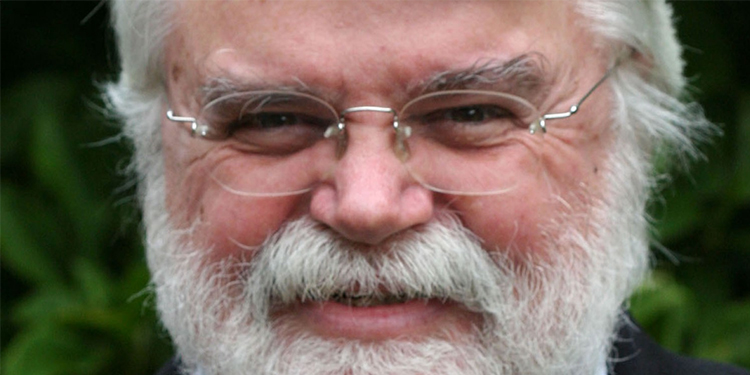
Prof. G. Erker Distinction for Professor Gerhard Erker
The Chemical Society of Japan (CSJ) has appointed Prof. Dr. Gerhard Erker as an honorary member. In doing so, the Japanese society recognized the outstanding achievements of the WWU professor in the field of chemistry.
Münster (upm/ch/lt) | 03.03.2017
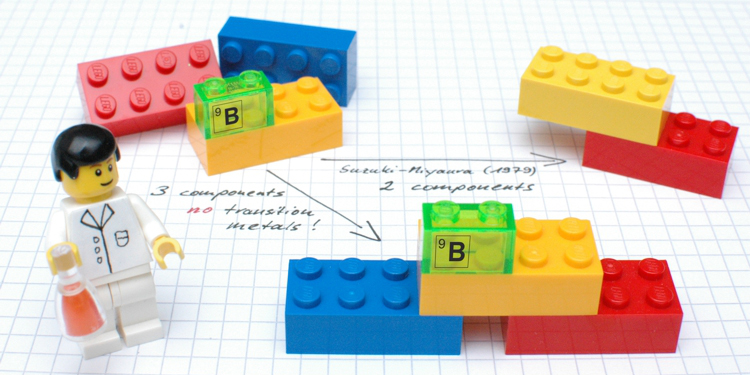
Uni MS - AK Studer (photo: lt) Radical Coupling Reaction published in Science
Within the Science magazine the Studer Research Group has published a unique concept for the transition metal-free formation of three C-C-bonds starting from vinylboron ate complexes.
Münster (upm/ch) | 17.01.2017
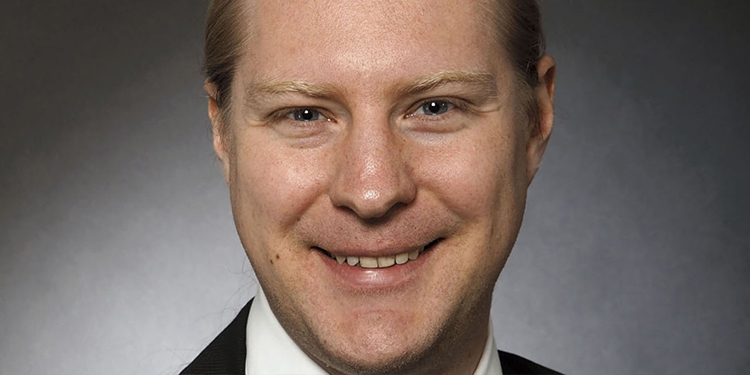
privat Manuel van Gemmeren leads new Otto Hahn Junion Research Group
Dr. Manuel van Gemmeren has been the head of an Otto Hahn Junior Research Group at the Max Planck Society (MPG) since January 2017. He researches and teaches at the WWU, but is also a member of the Max Planck Institute for Chemical Energy Conversion in Mülheim an der Ruhr.
2016
Münster (upm) | 23.09.2016
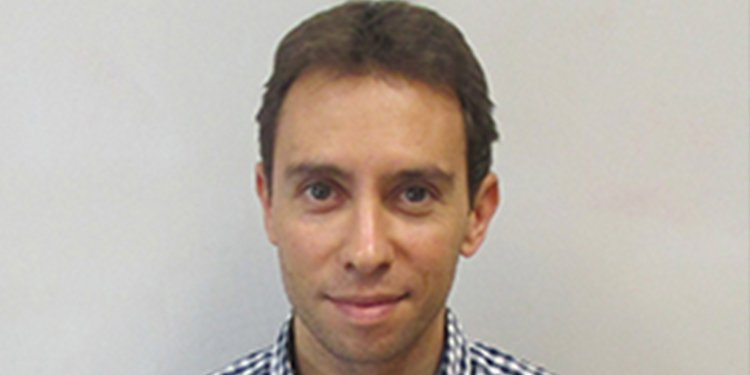
Prof. G. Fernández EU Funds WWU-Chemist with 1.5 Million Euros
Prof. Dr. Gustavo Fernández Huerta receives the Starting Grant of the European Research Council (ERC)
Münster (Glorius) | 01.09.2016
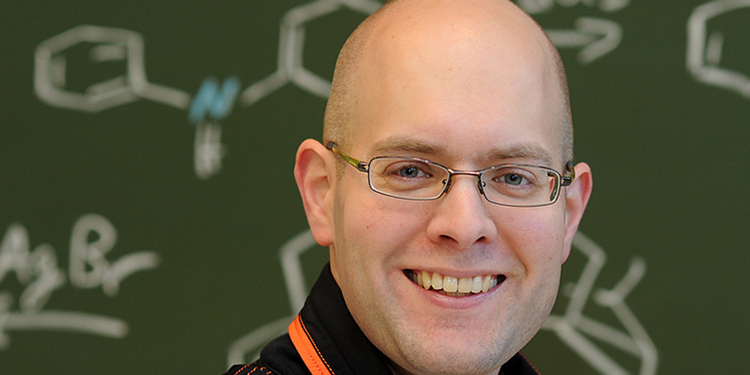
Peter Grewer, Uni MS Prof. Dr. Frank Glorius receives the Mukaiyama Award
The Society of Synthetic Organic Chemistry of Japan has selected Prof. Dr. Frank Glorius as the winner of the 2017 Mukaiyama Prize.
Münster (upm) | 10.05.2016

Prof. A. Studer Million-Euro-Funding for Chemist
European Research Council awards Prof. Armido Studer with an “Advanced Grant”
